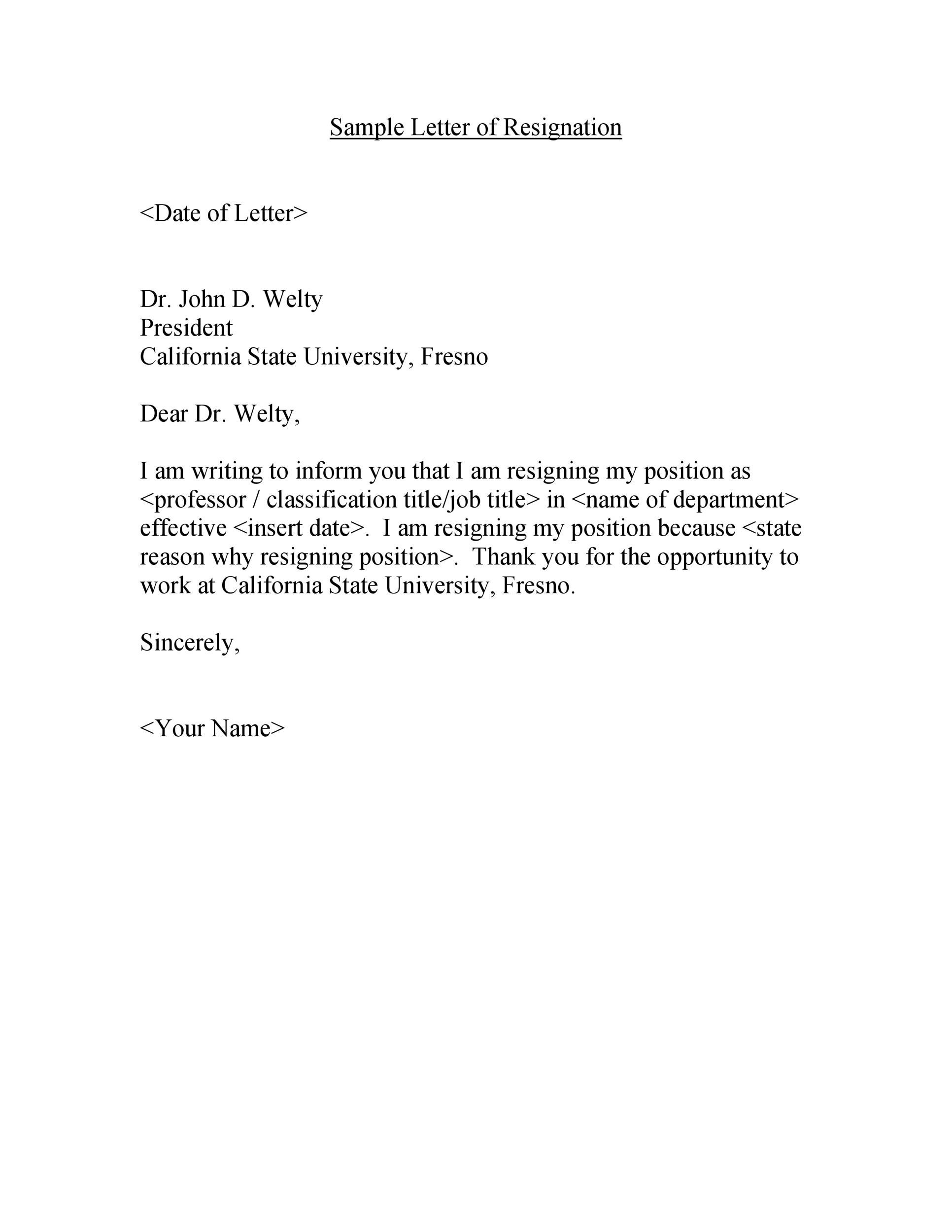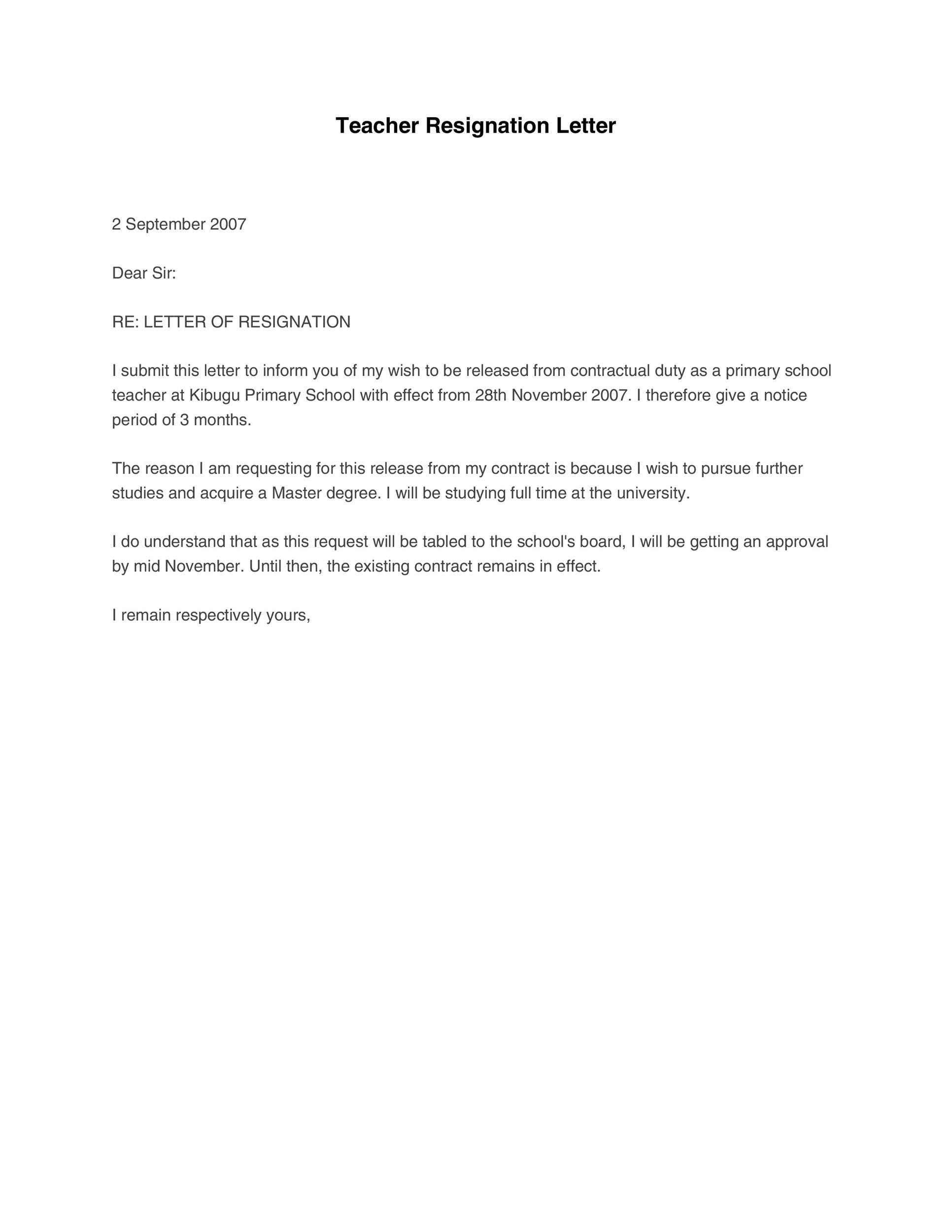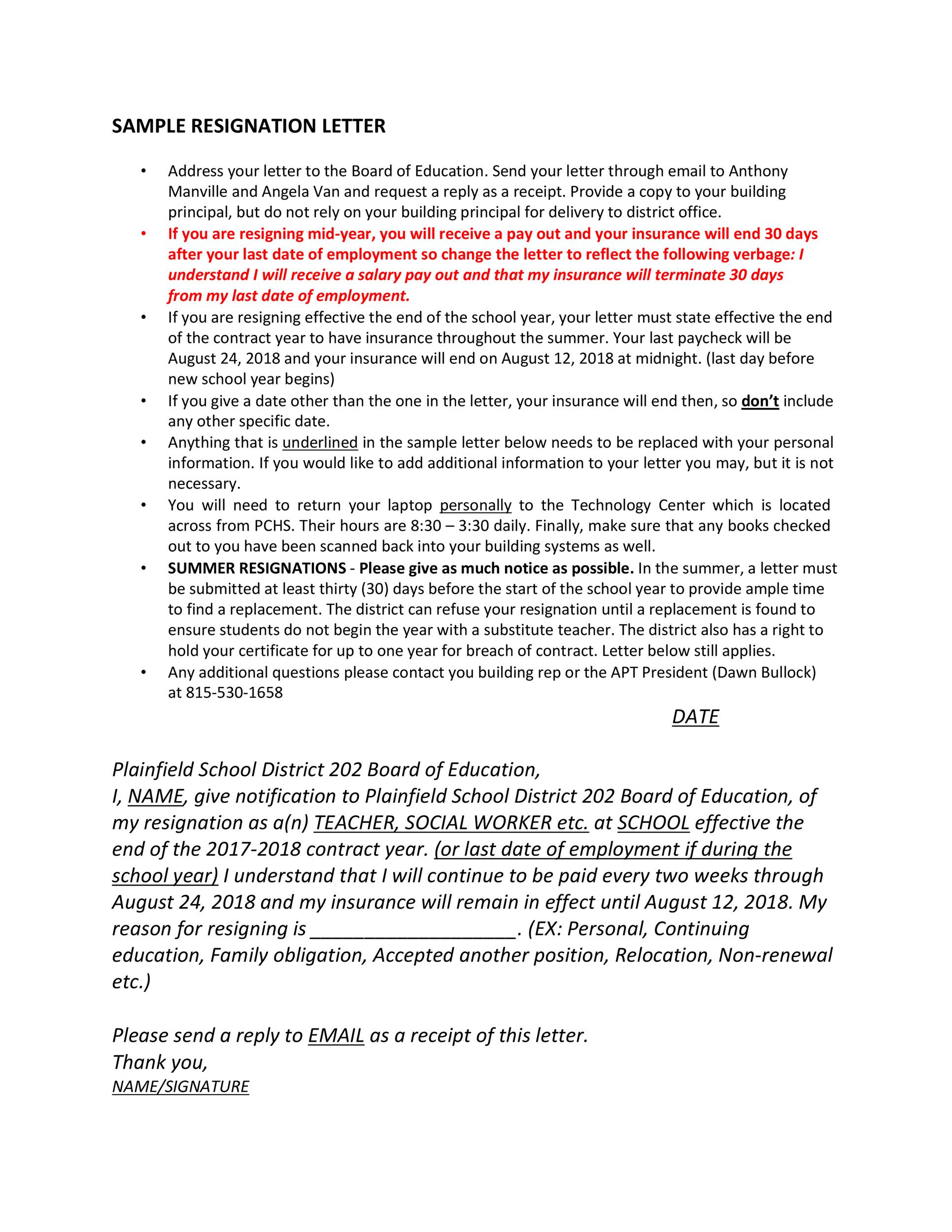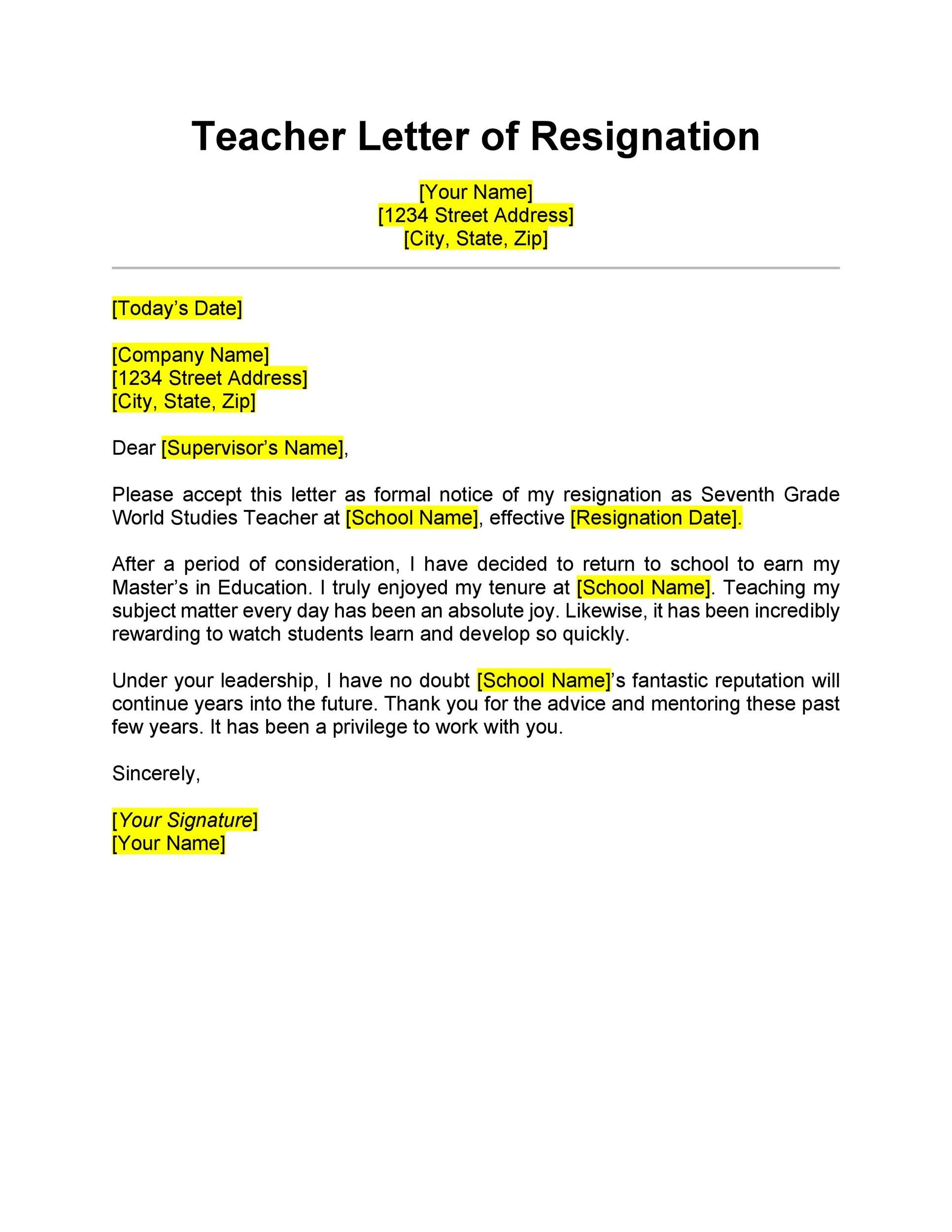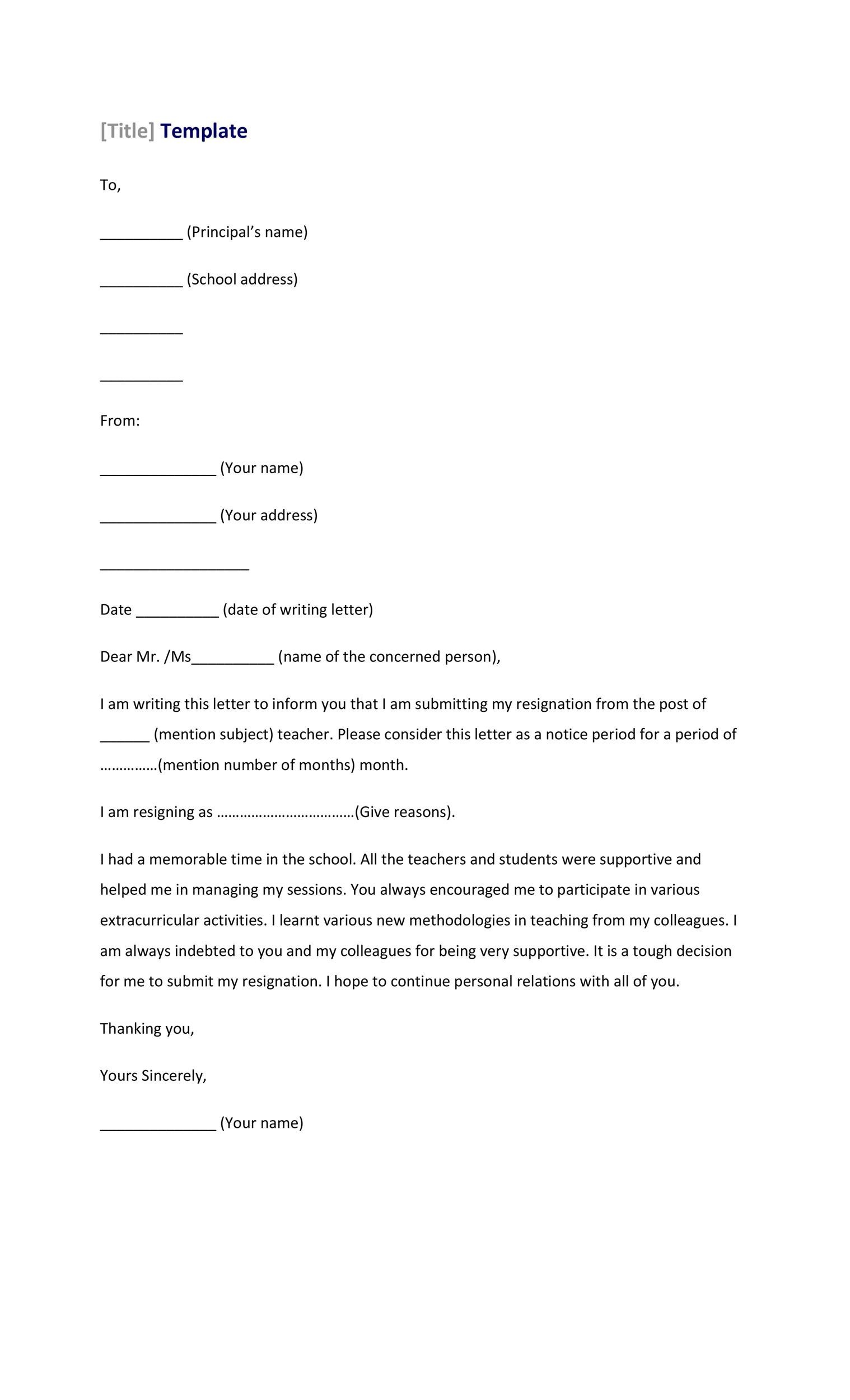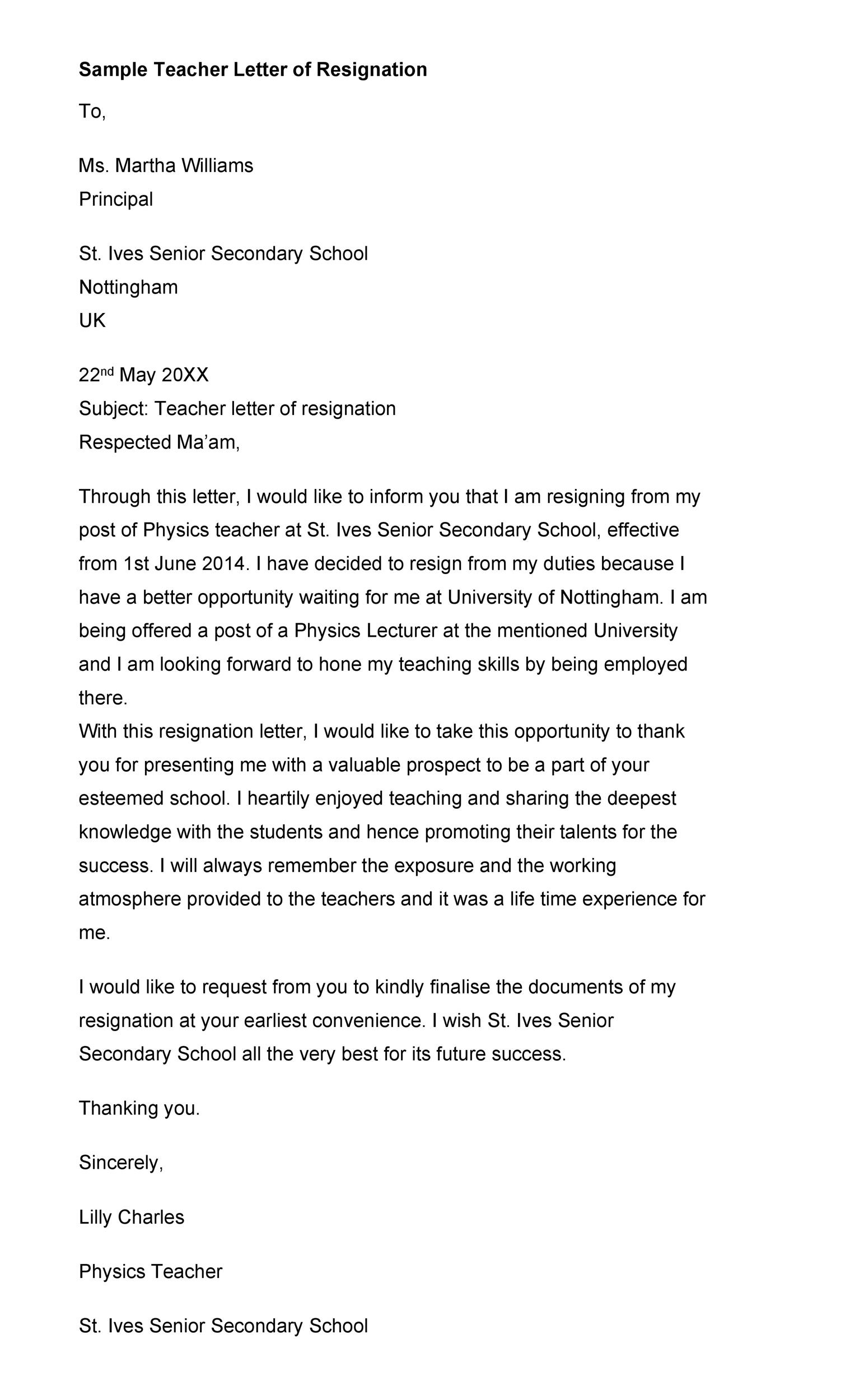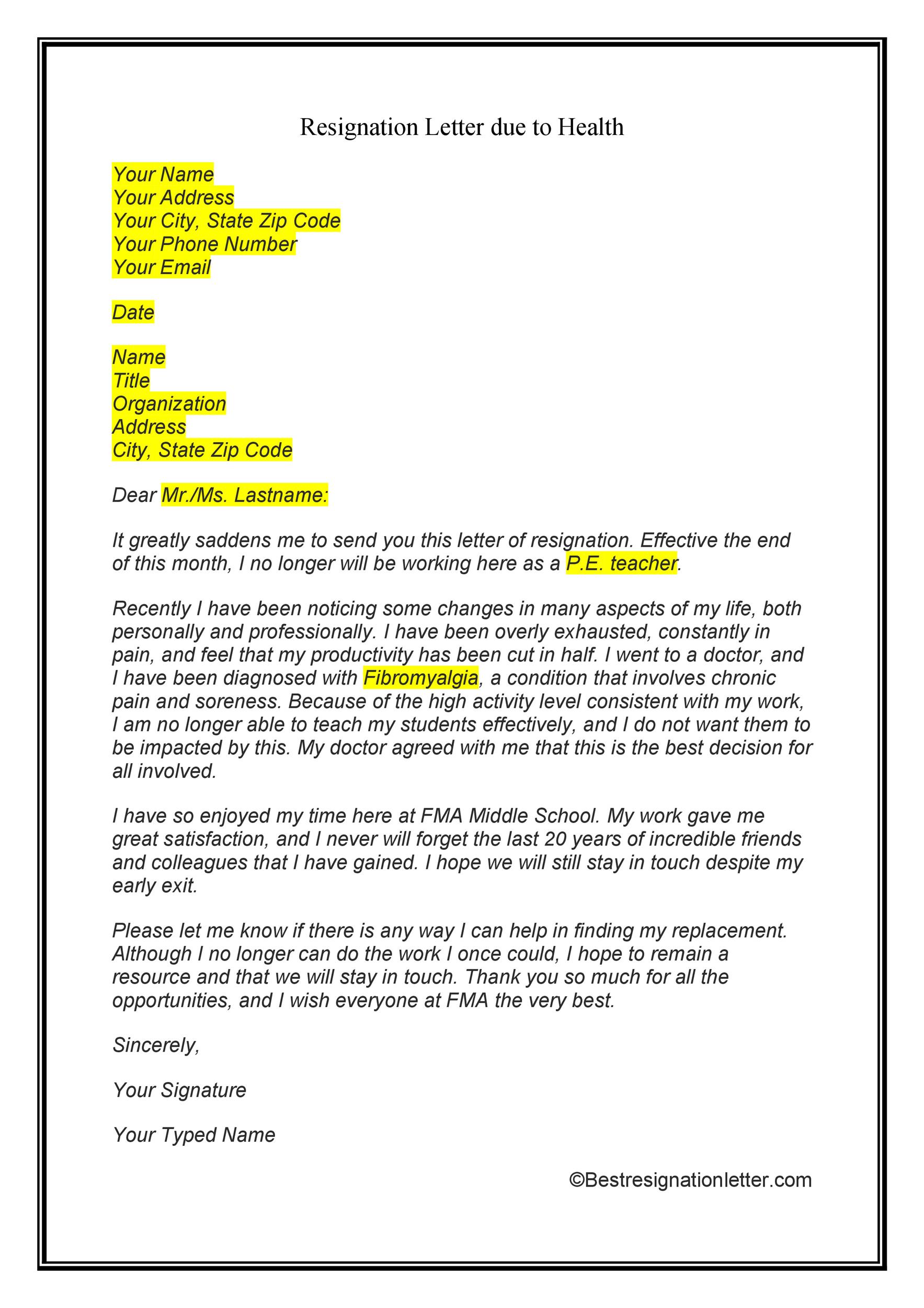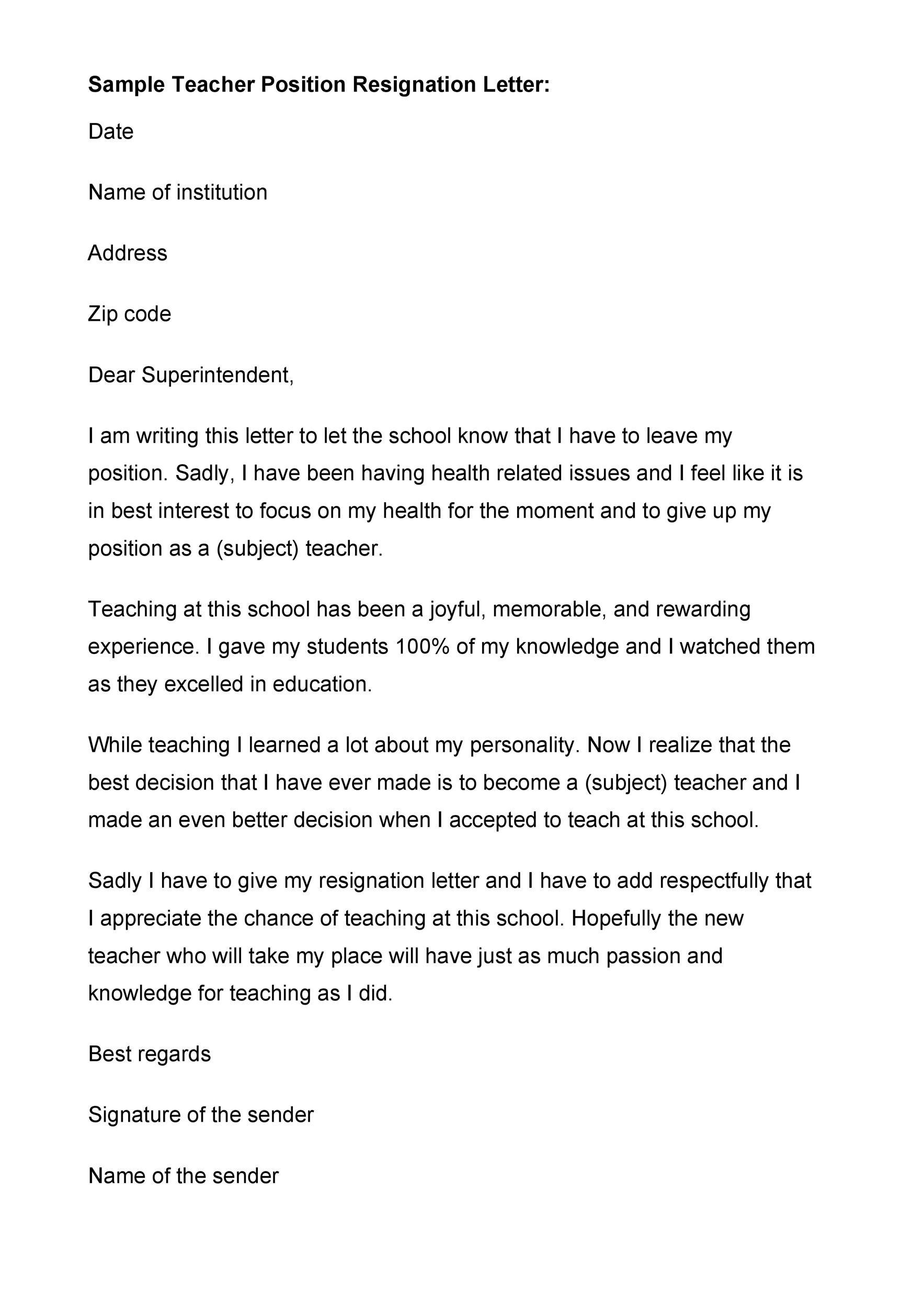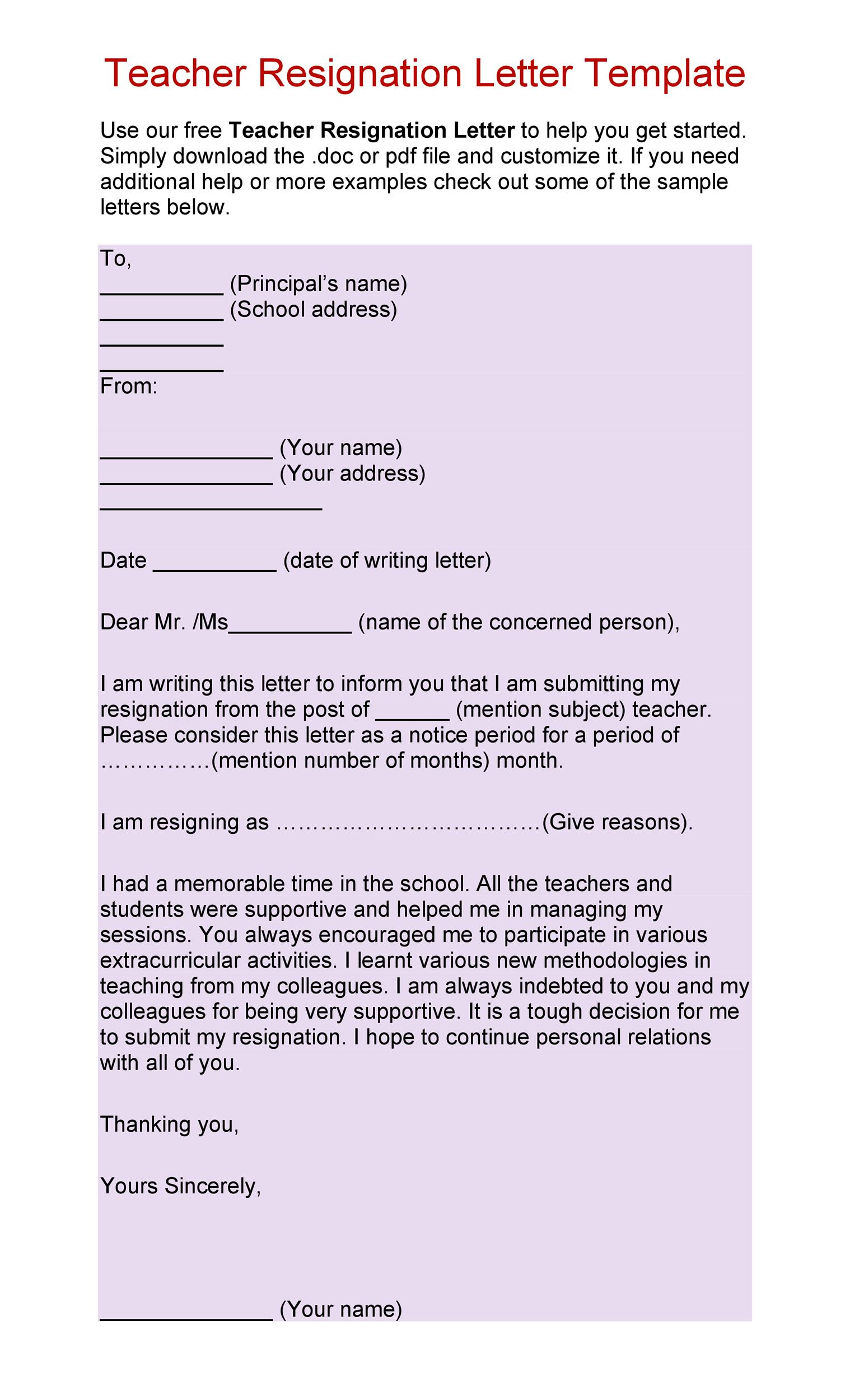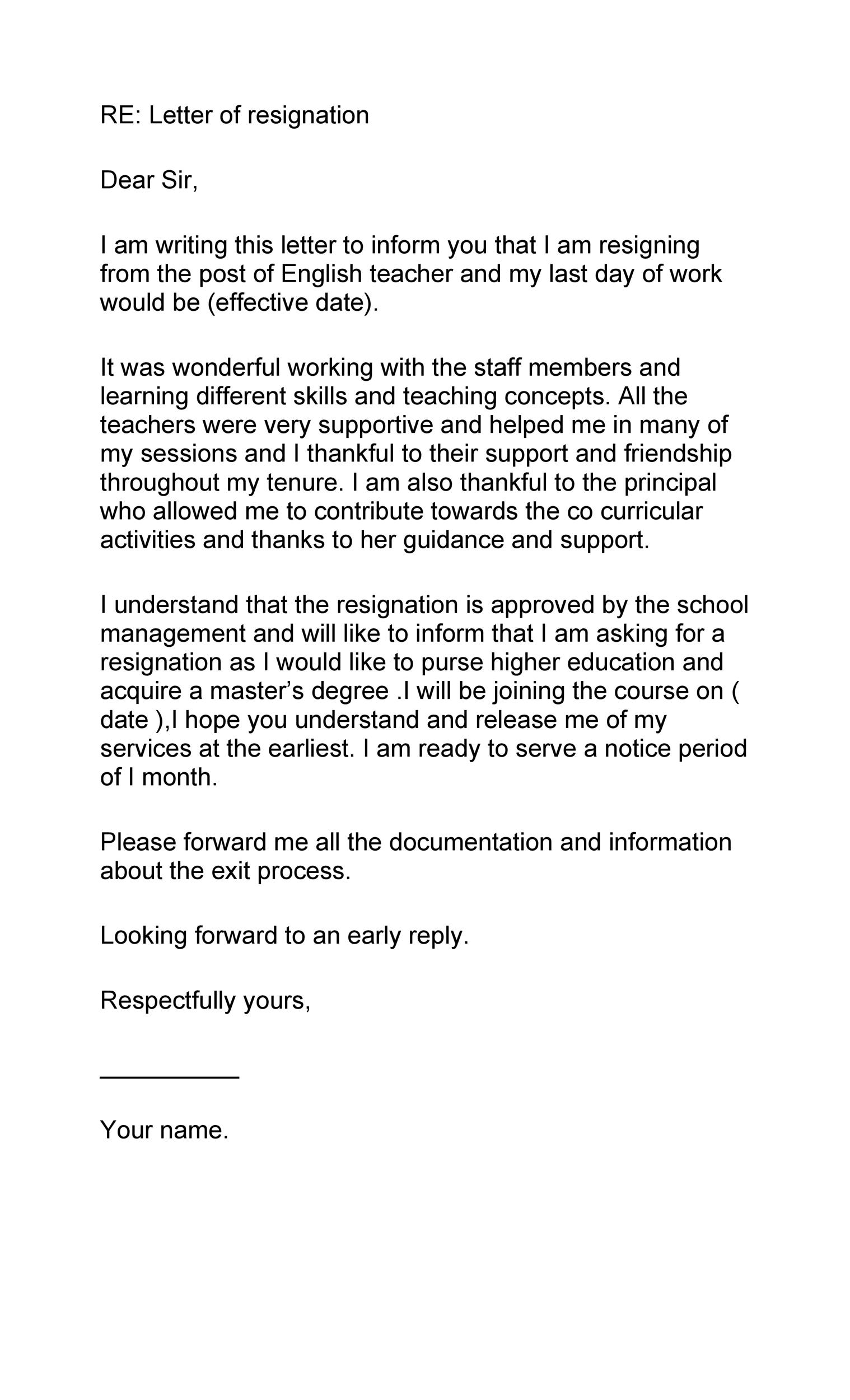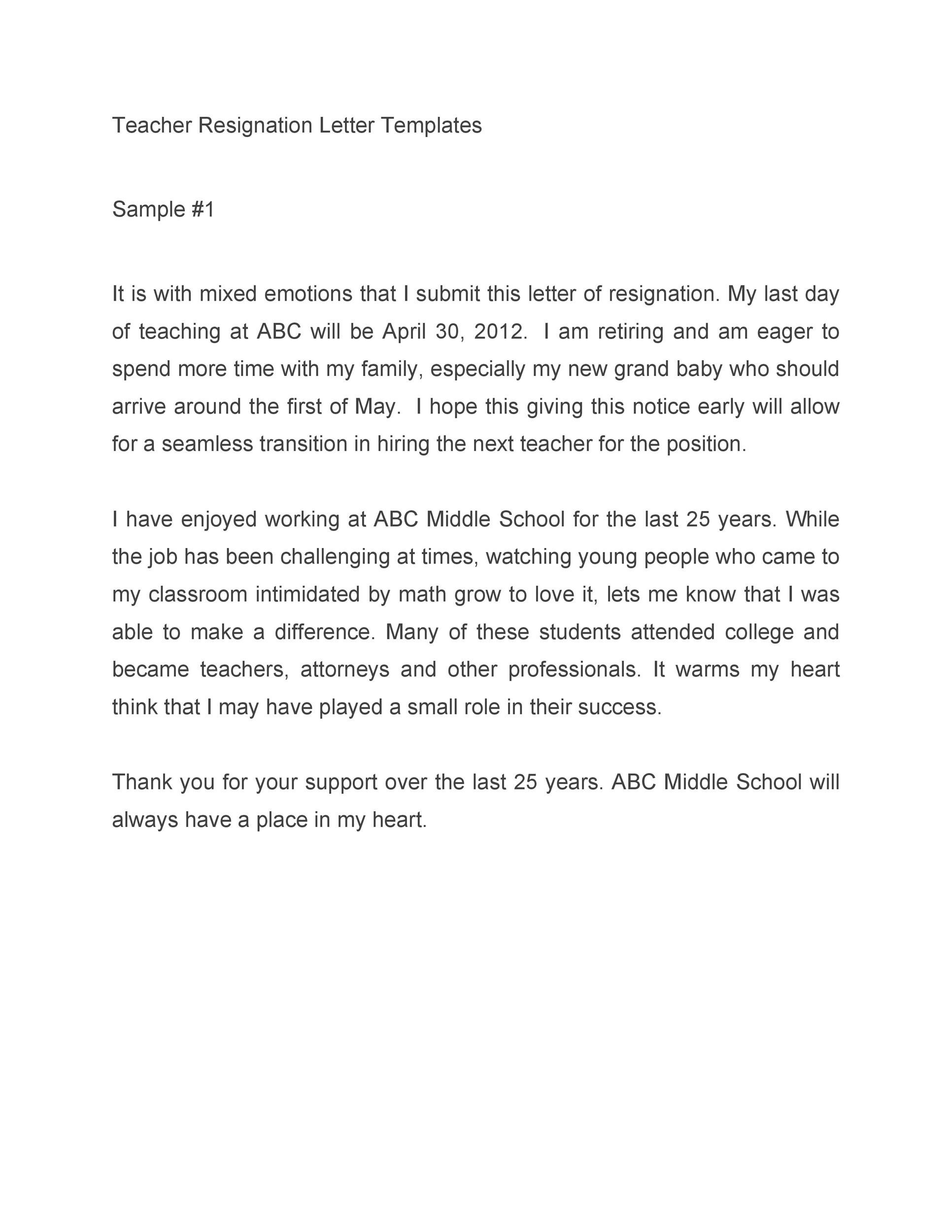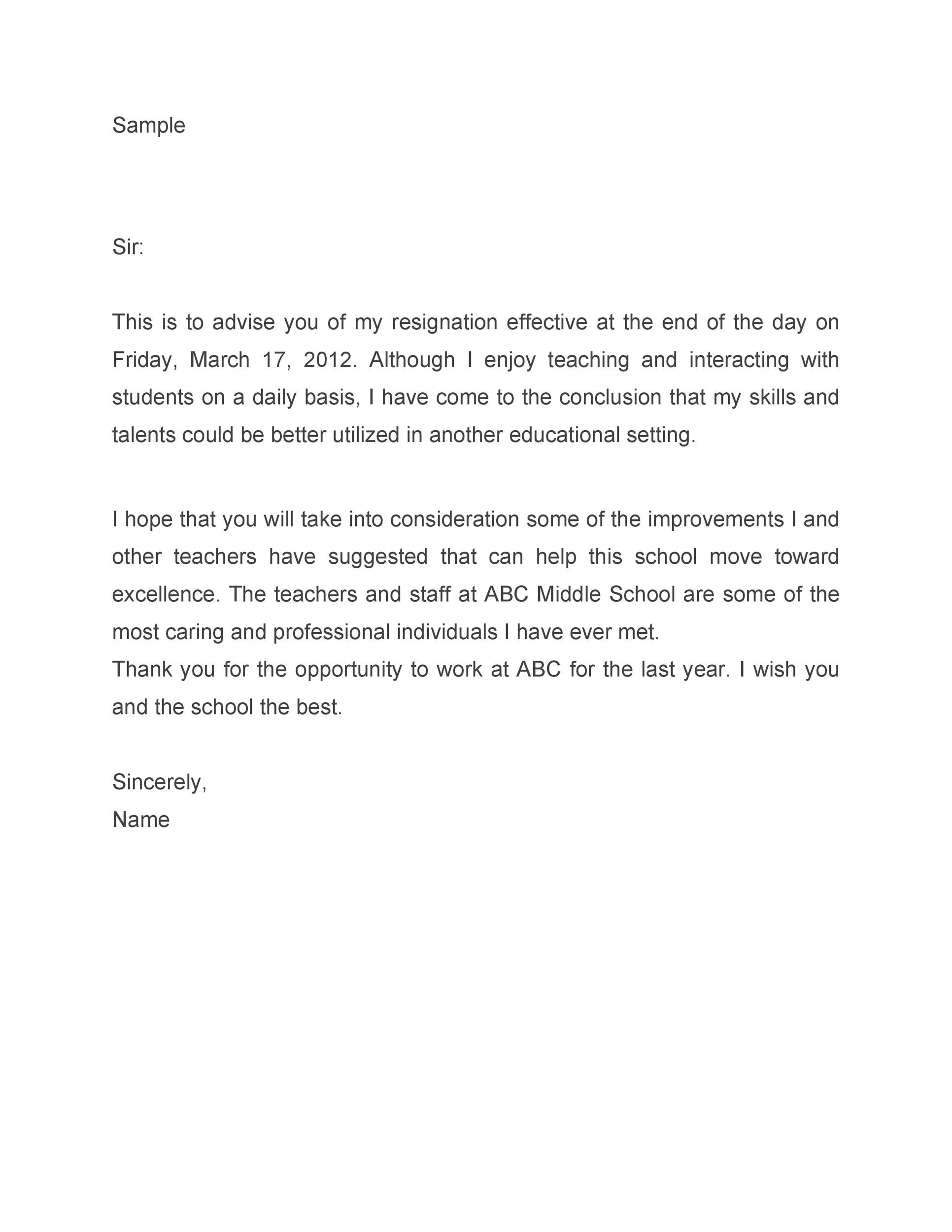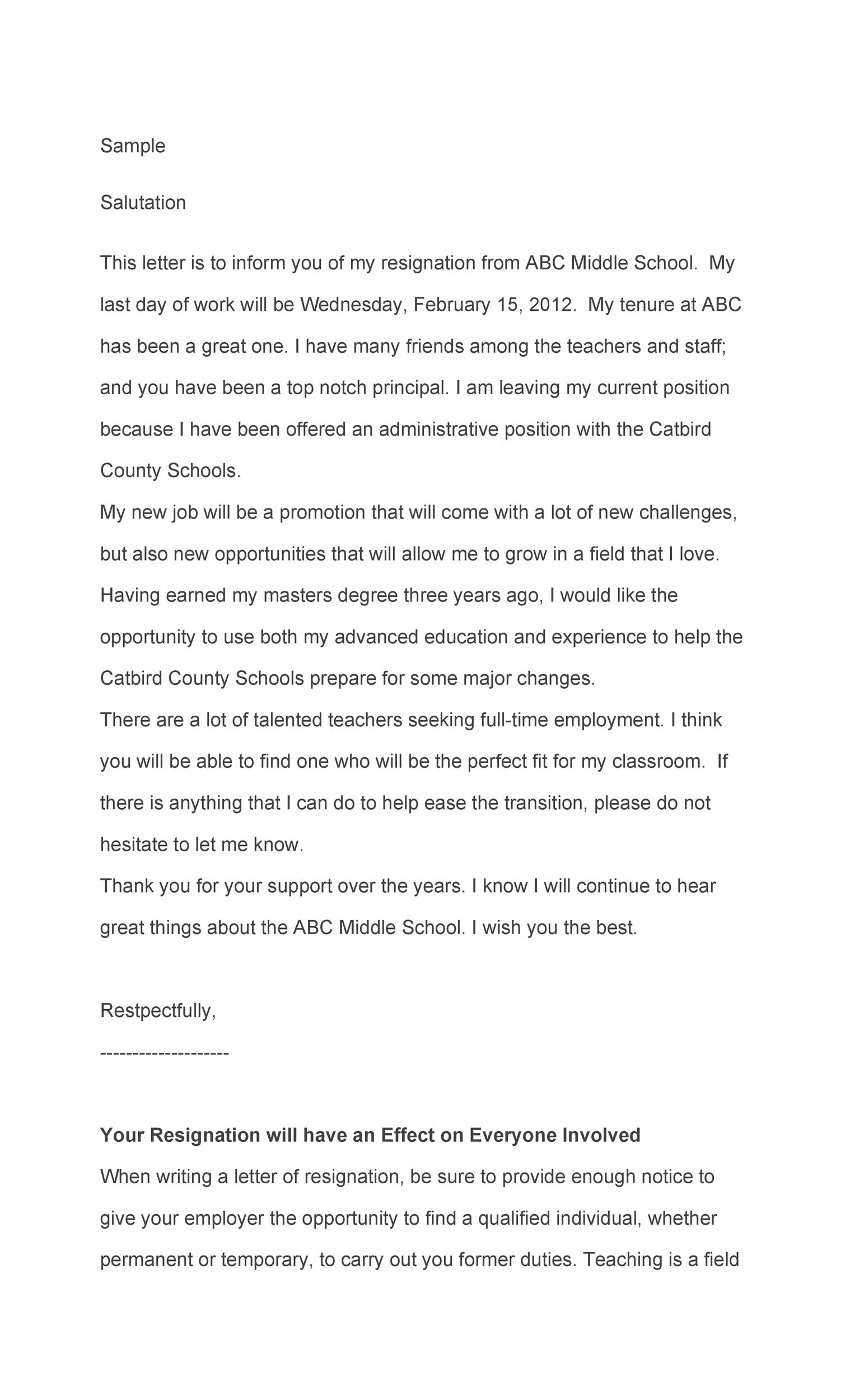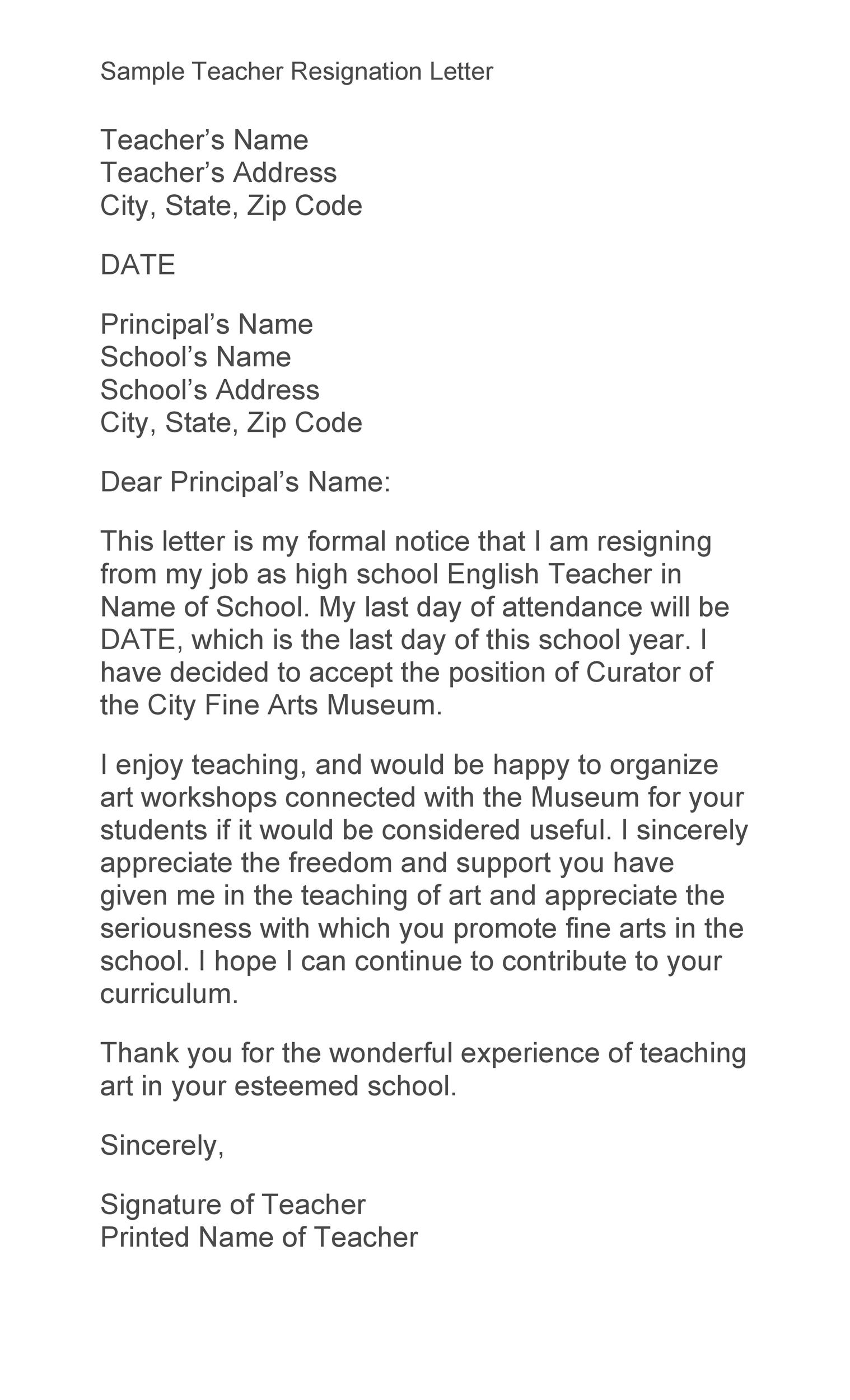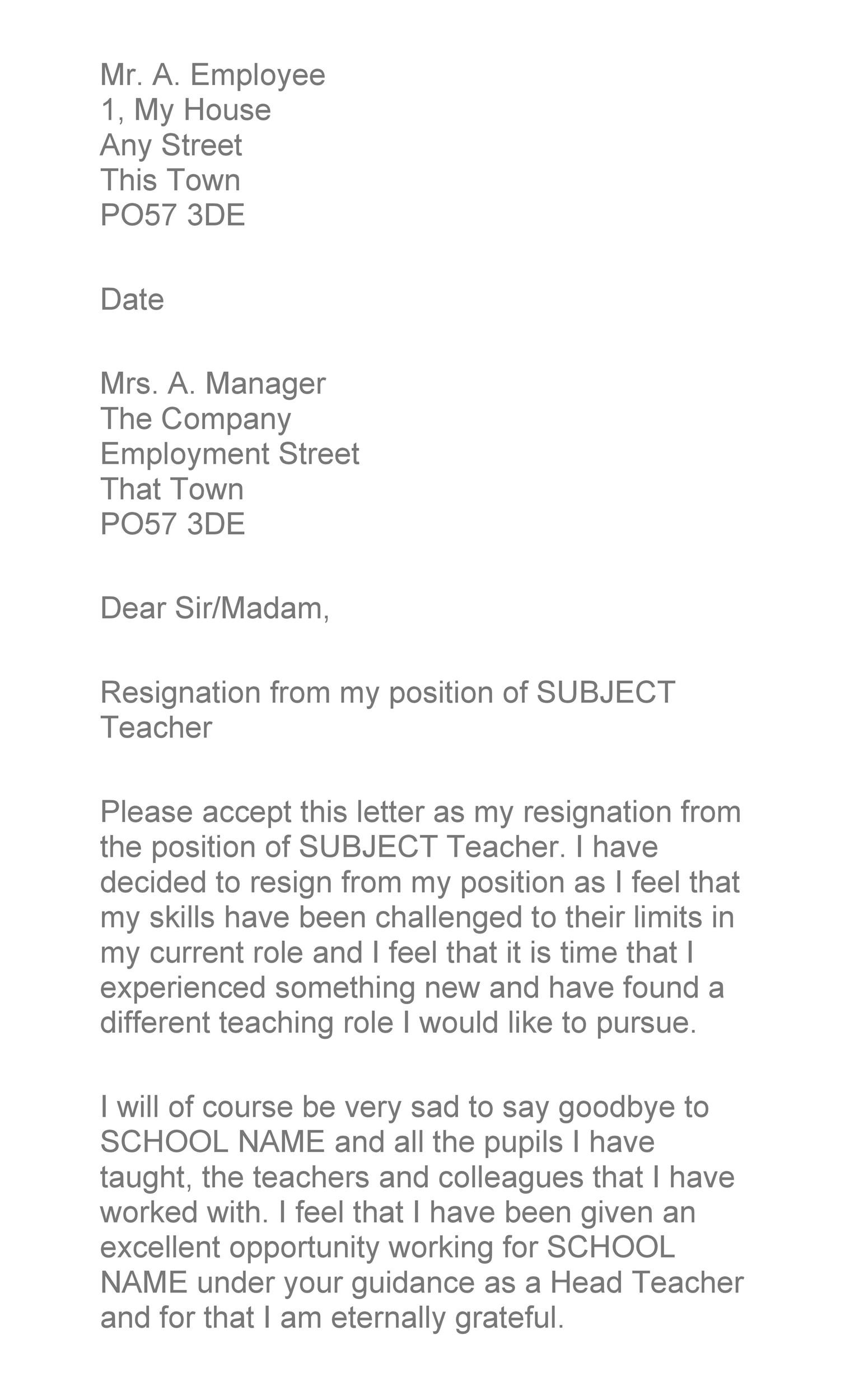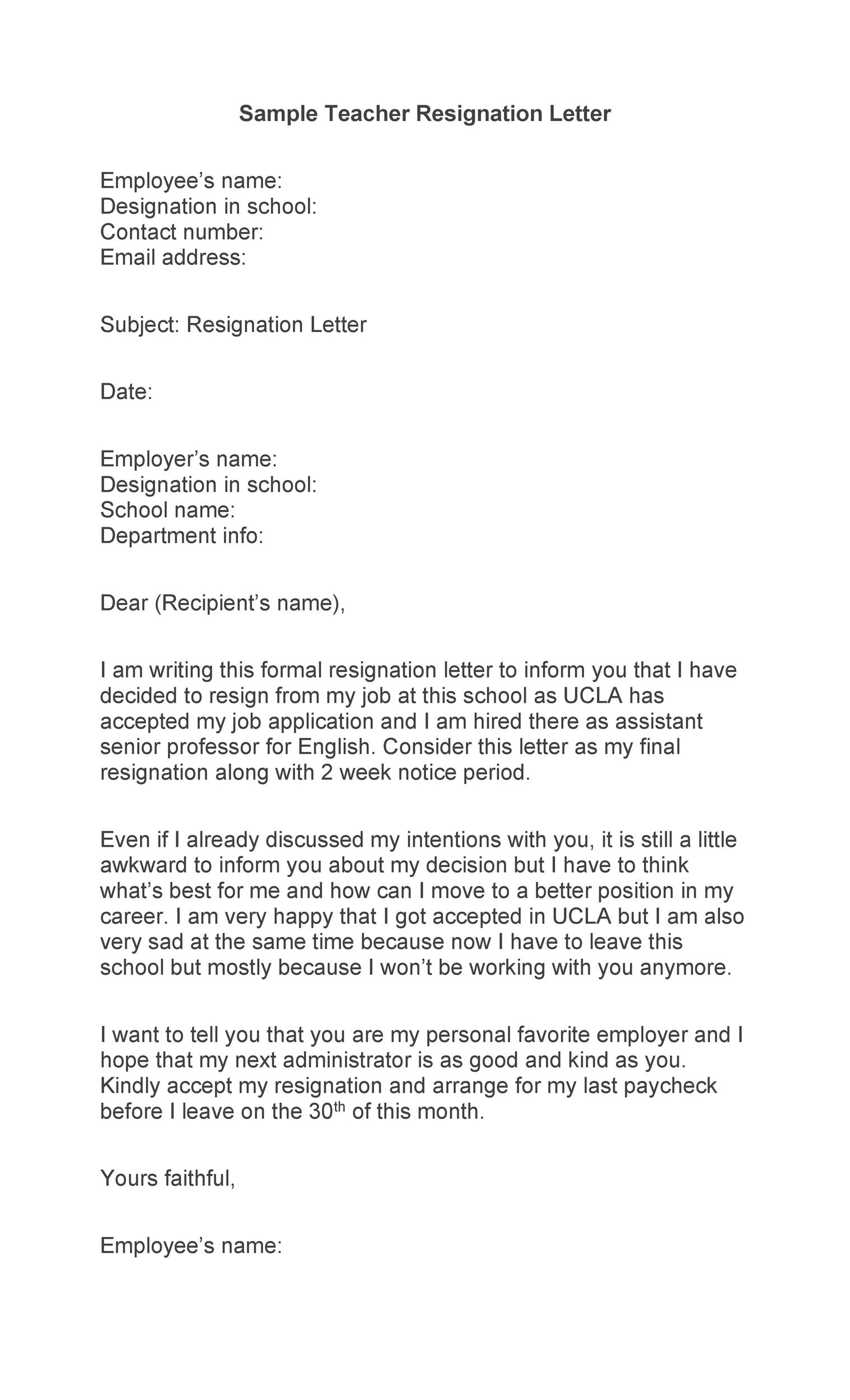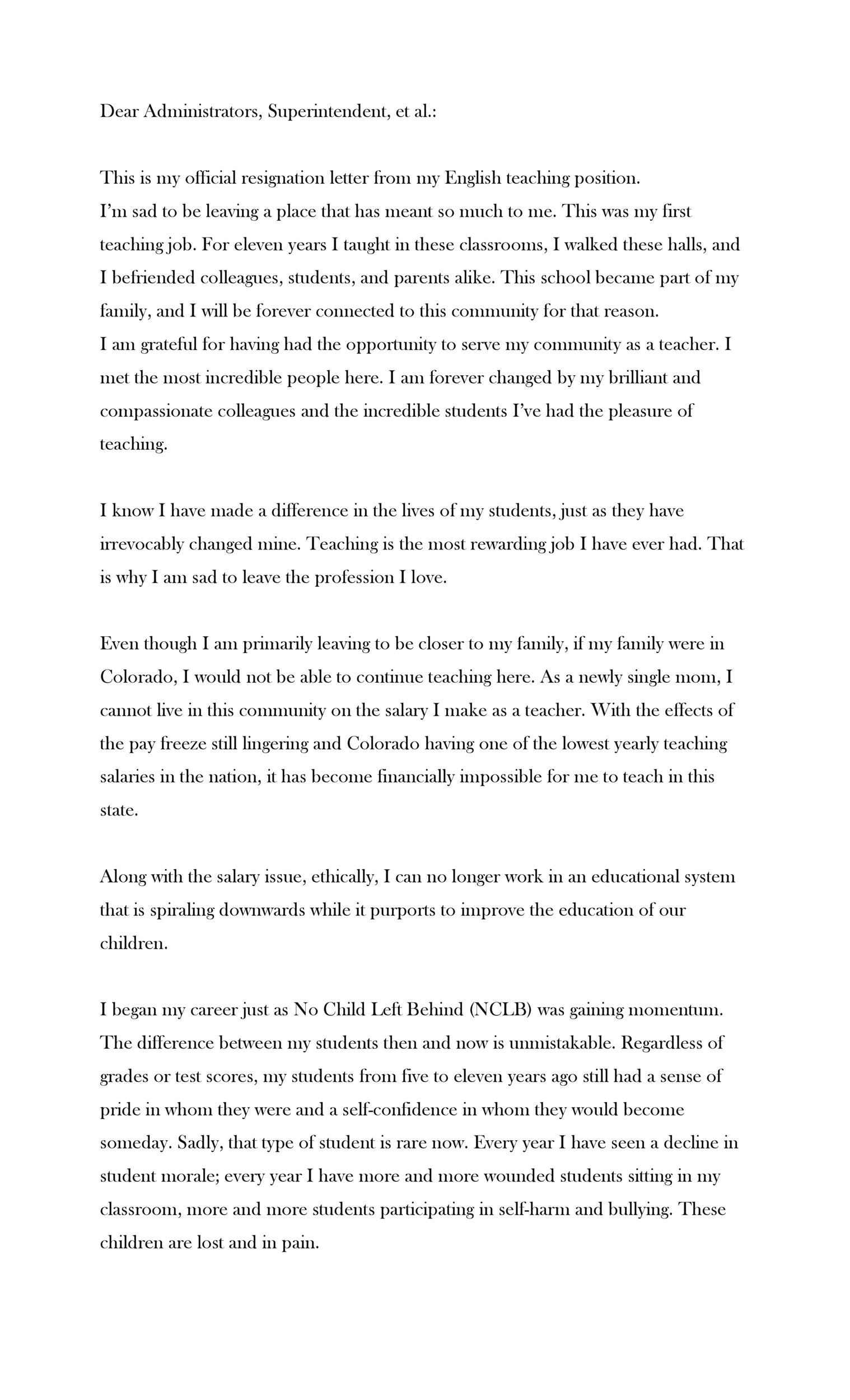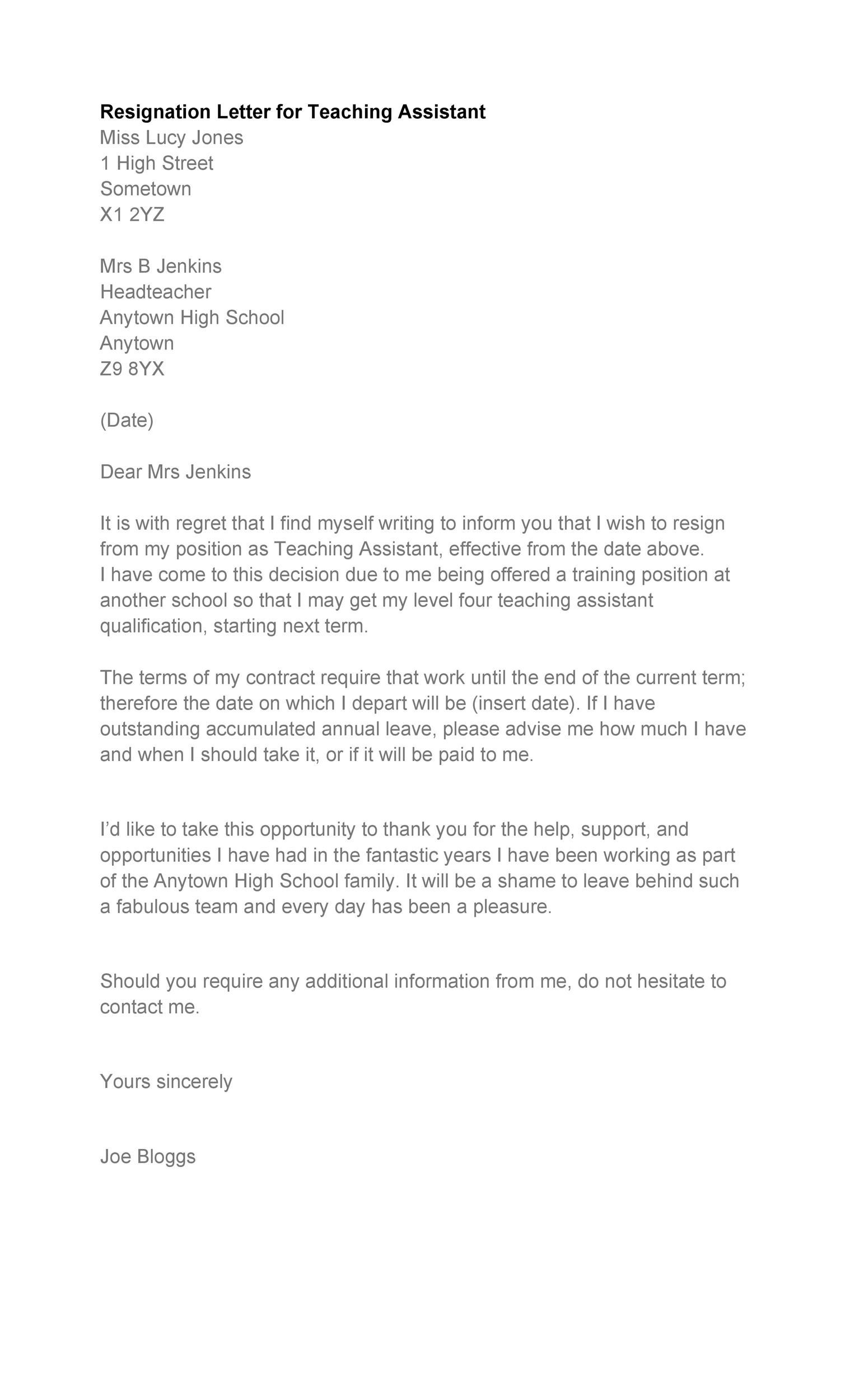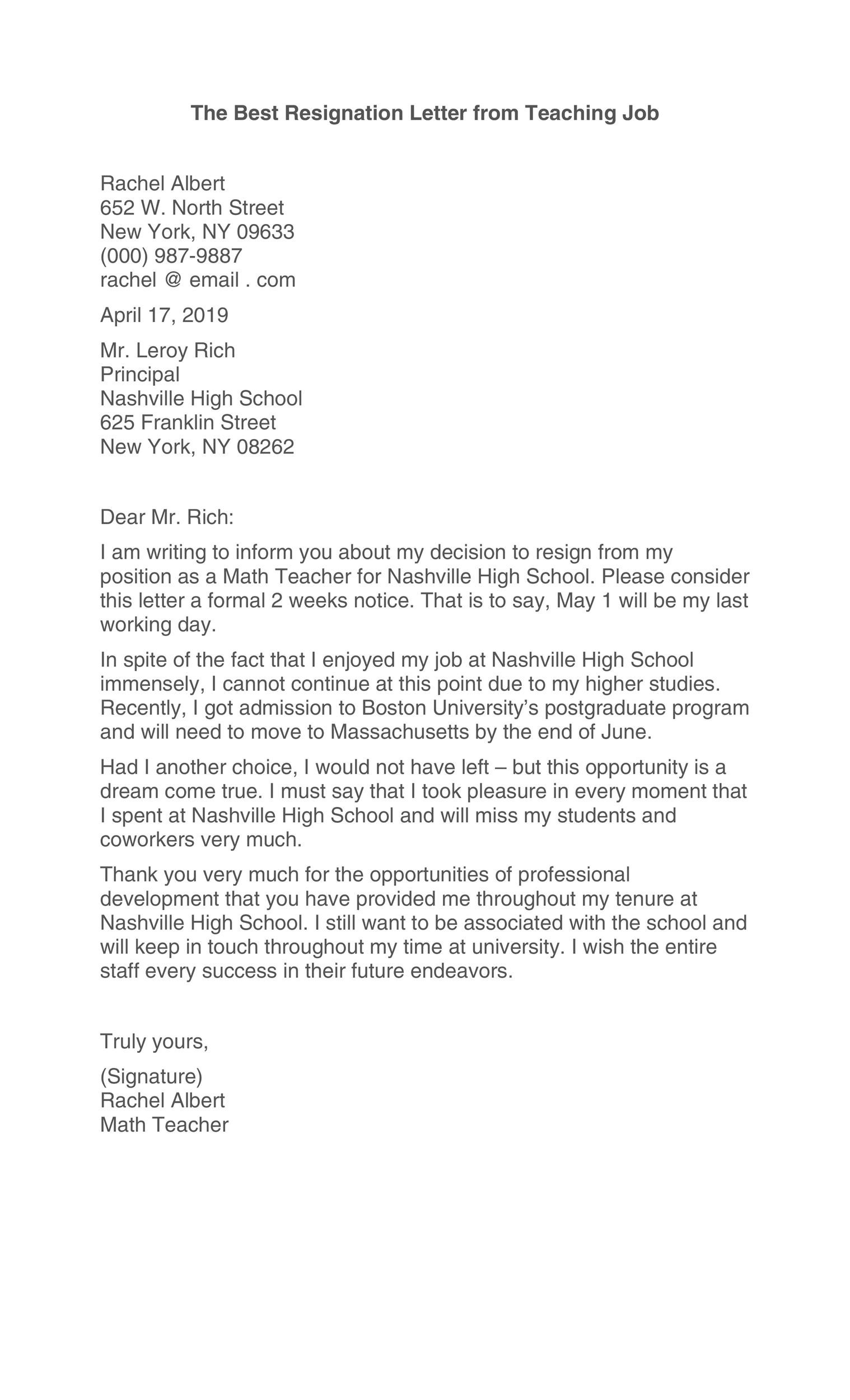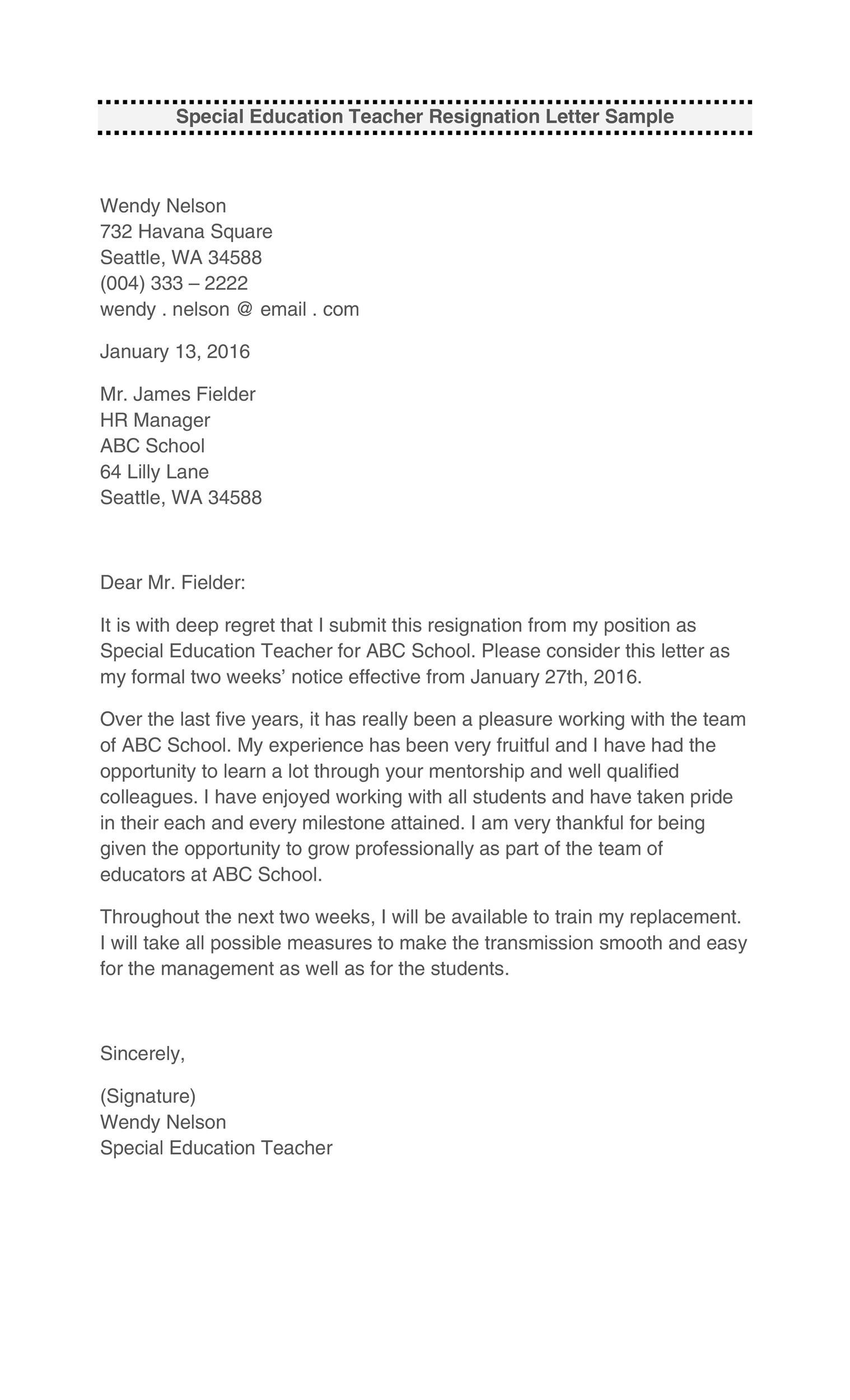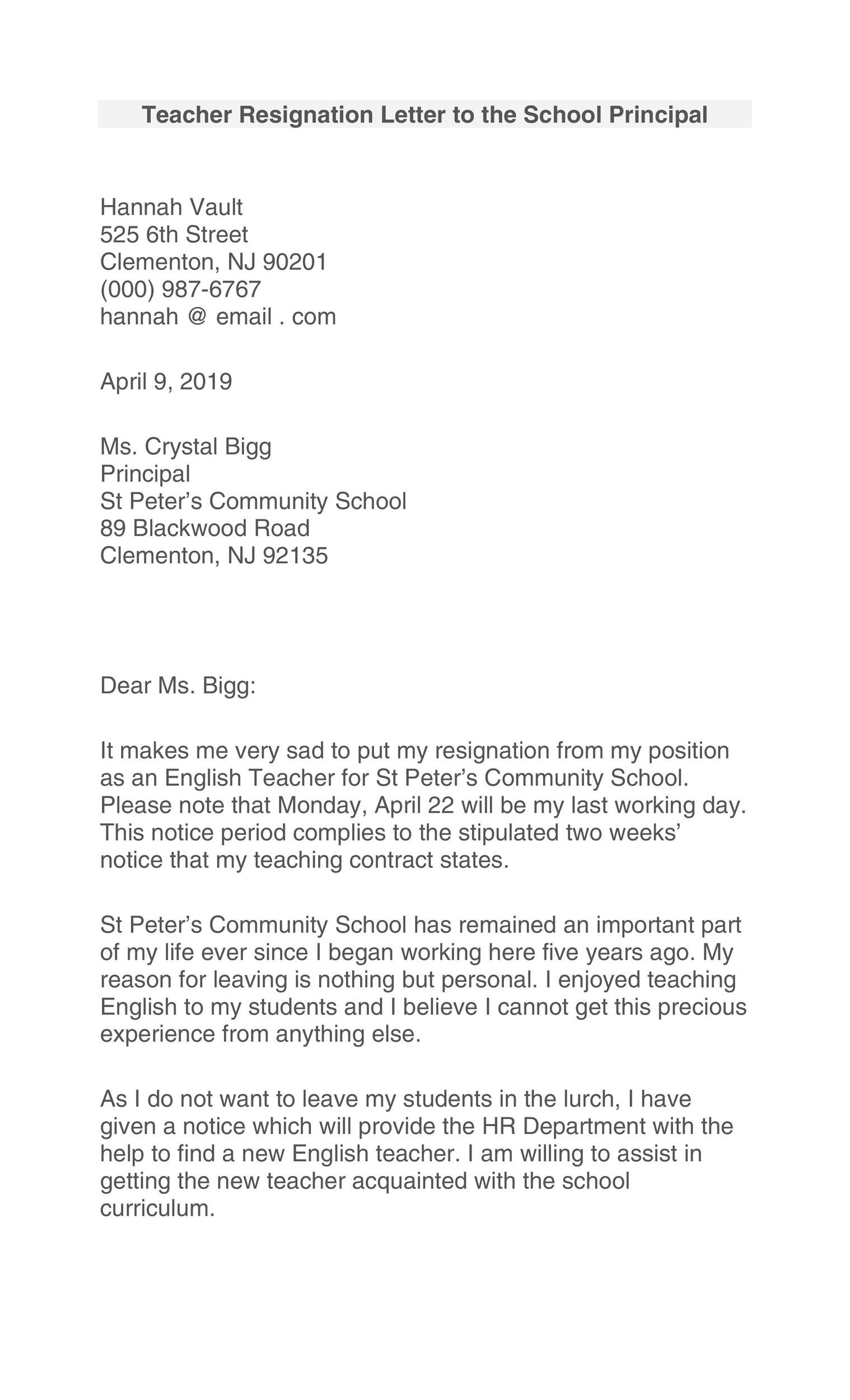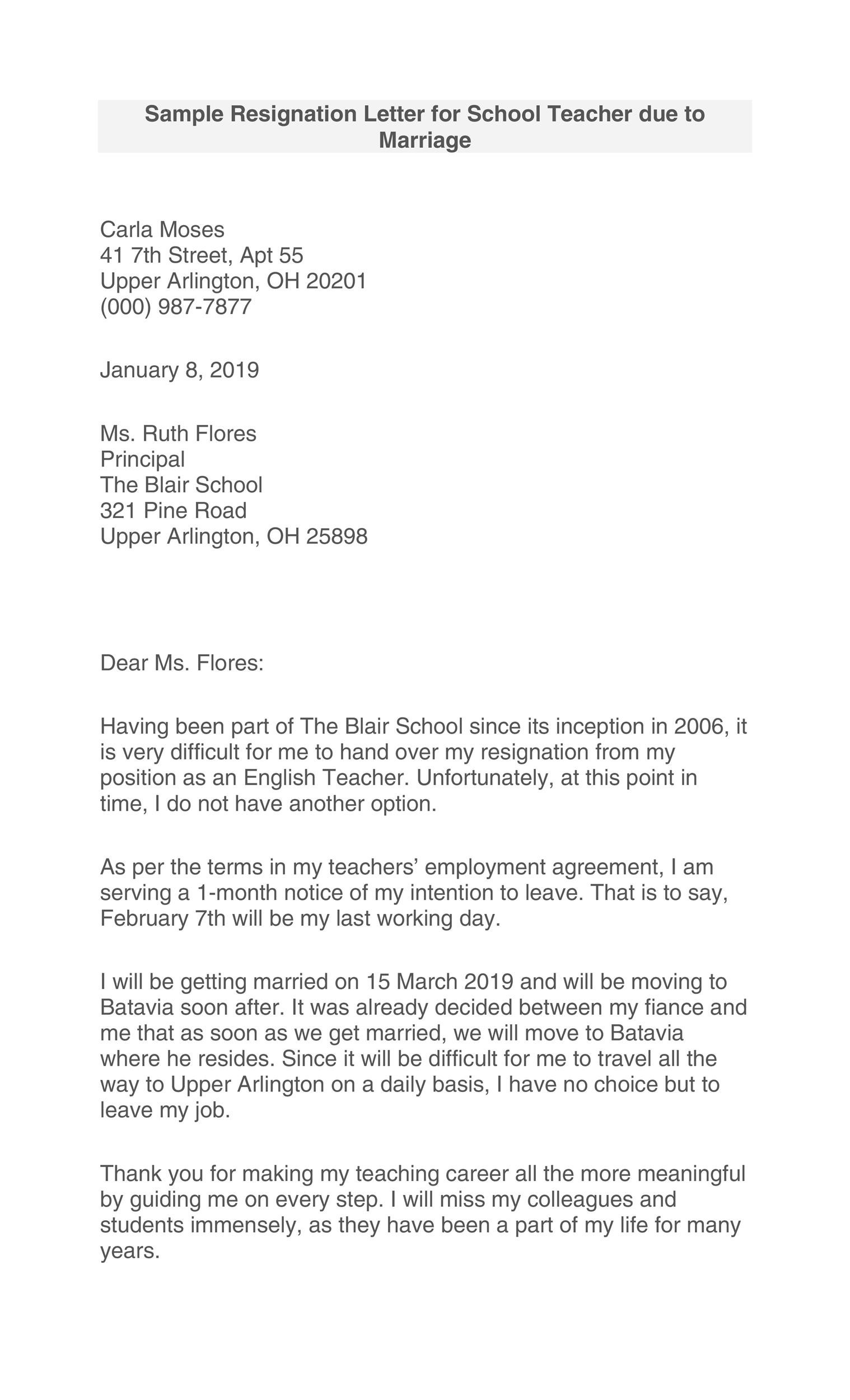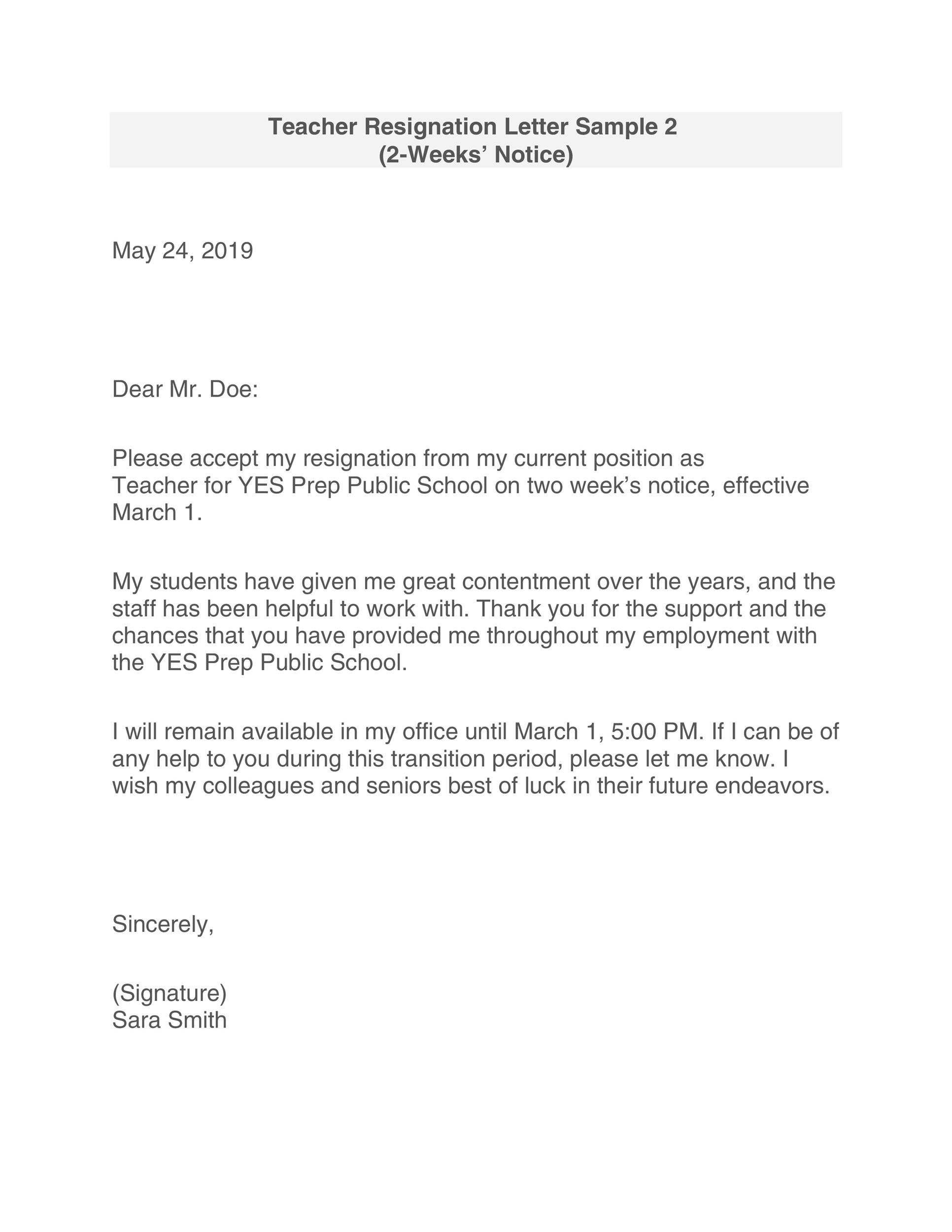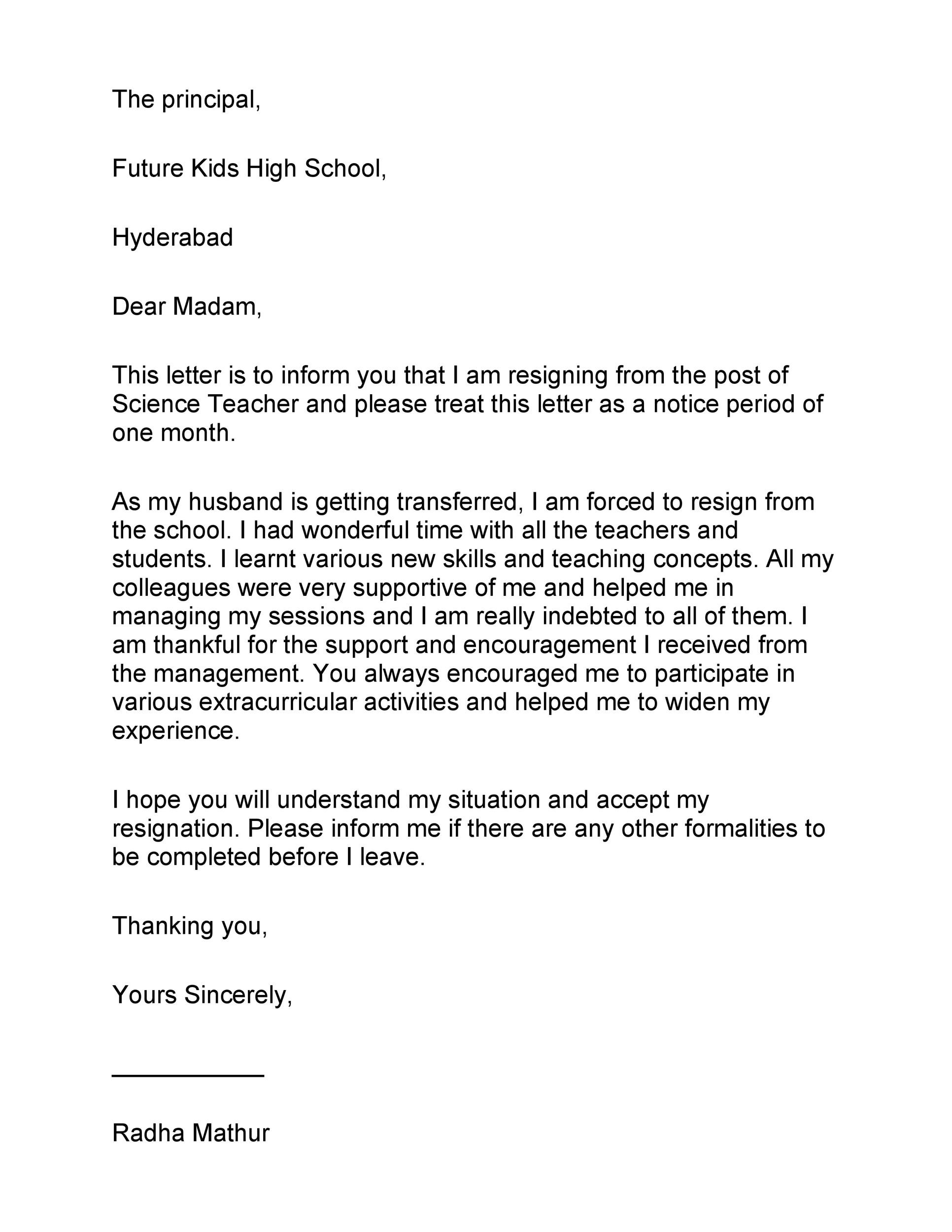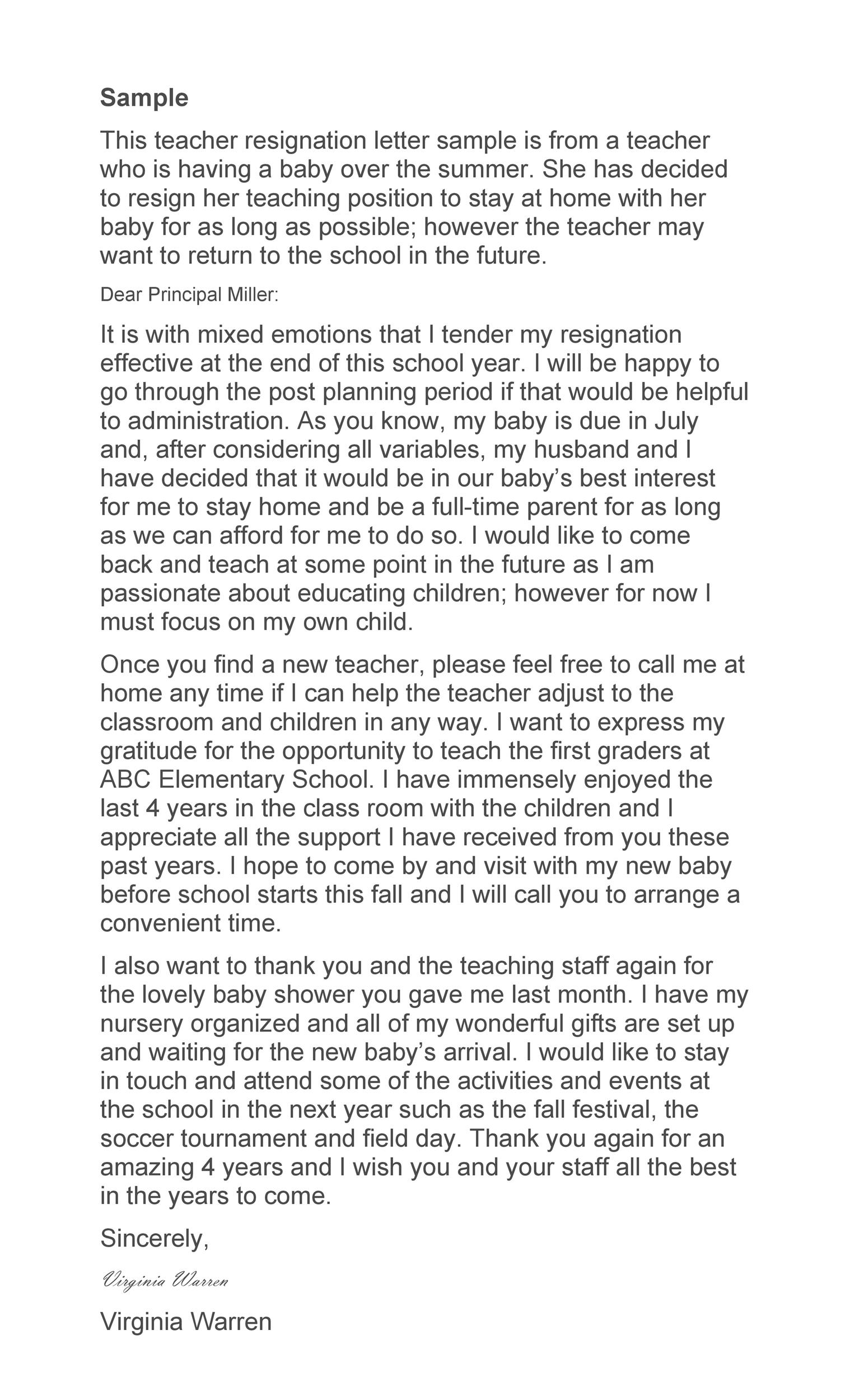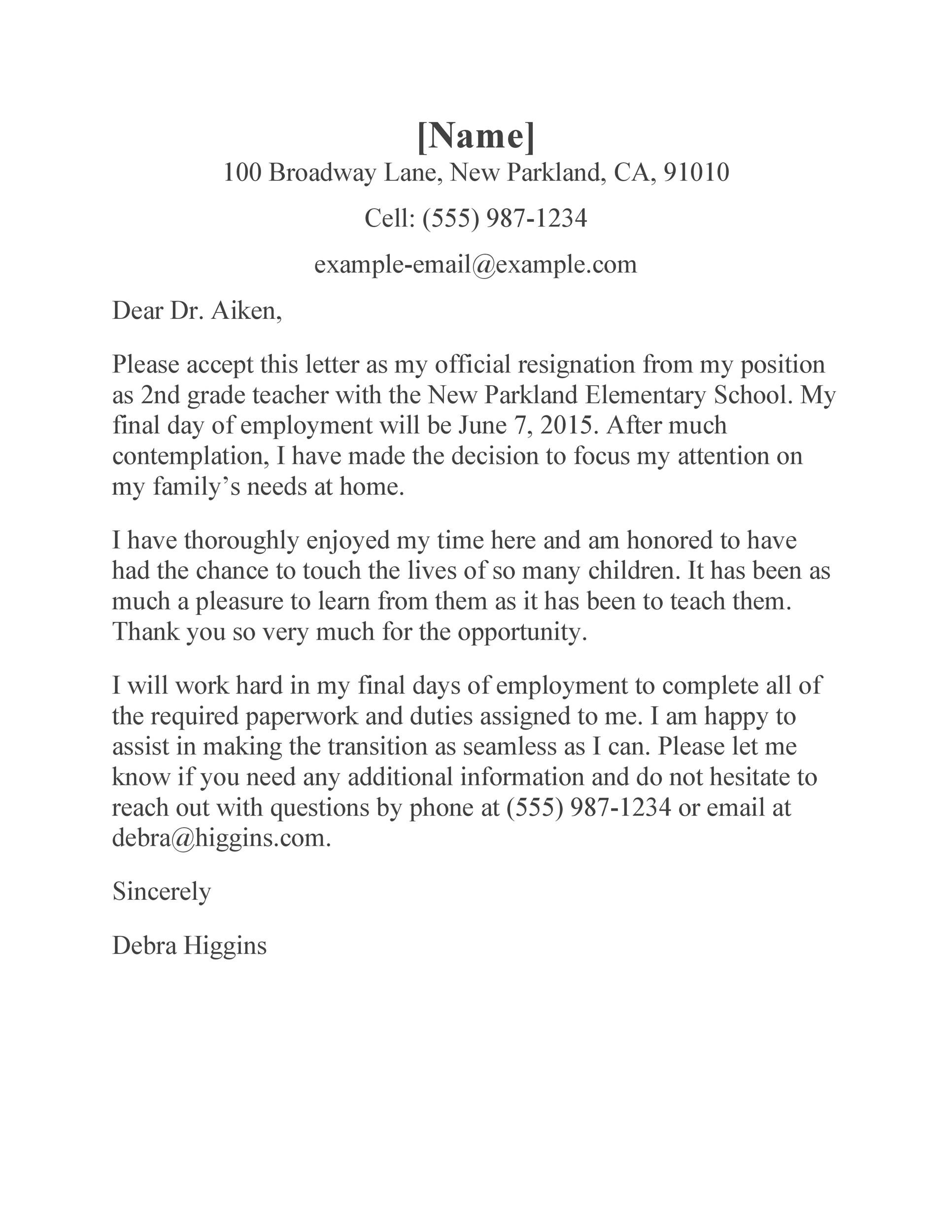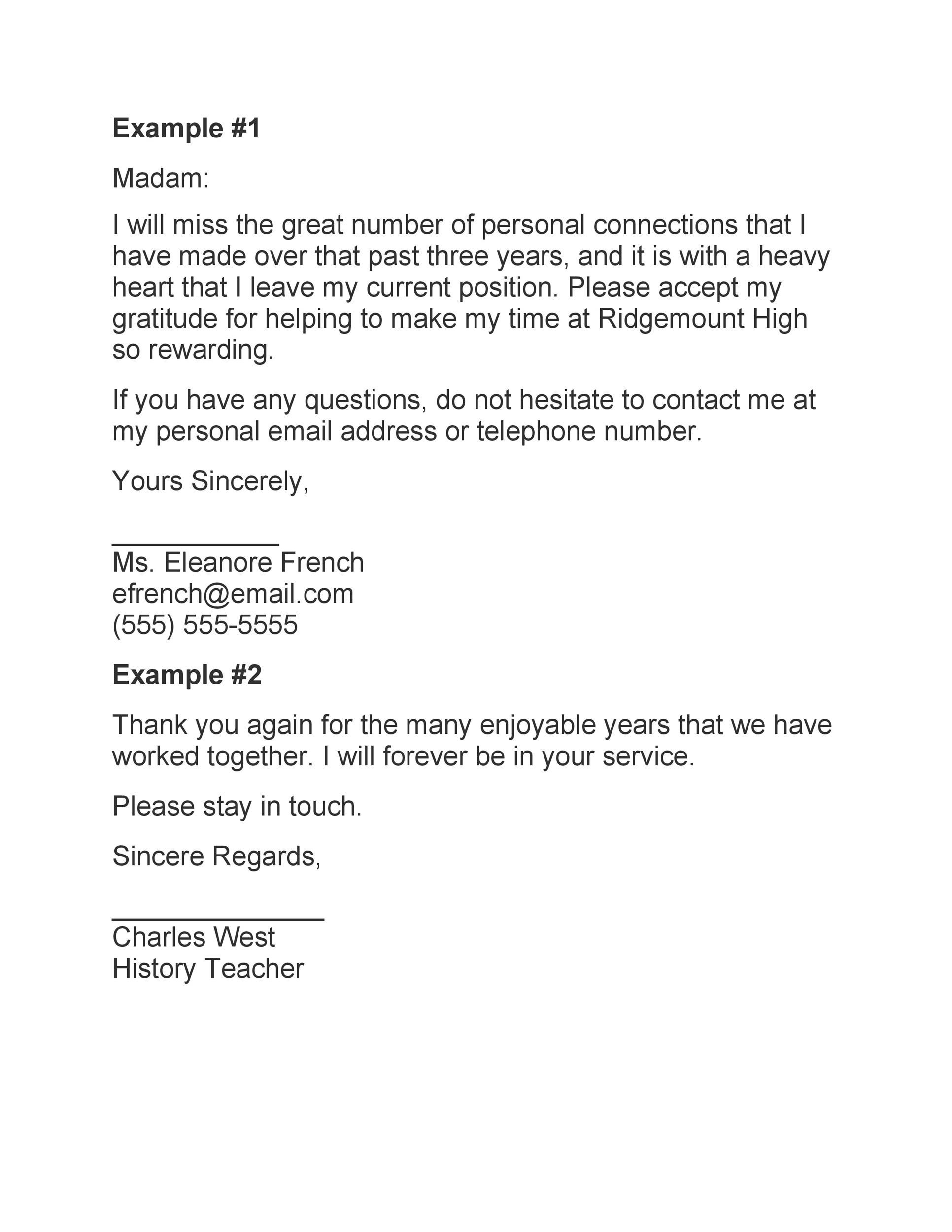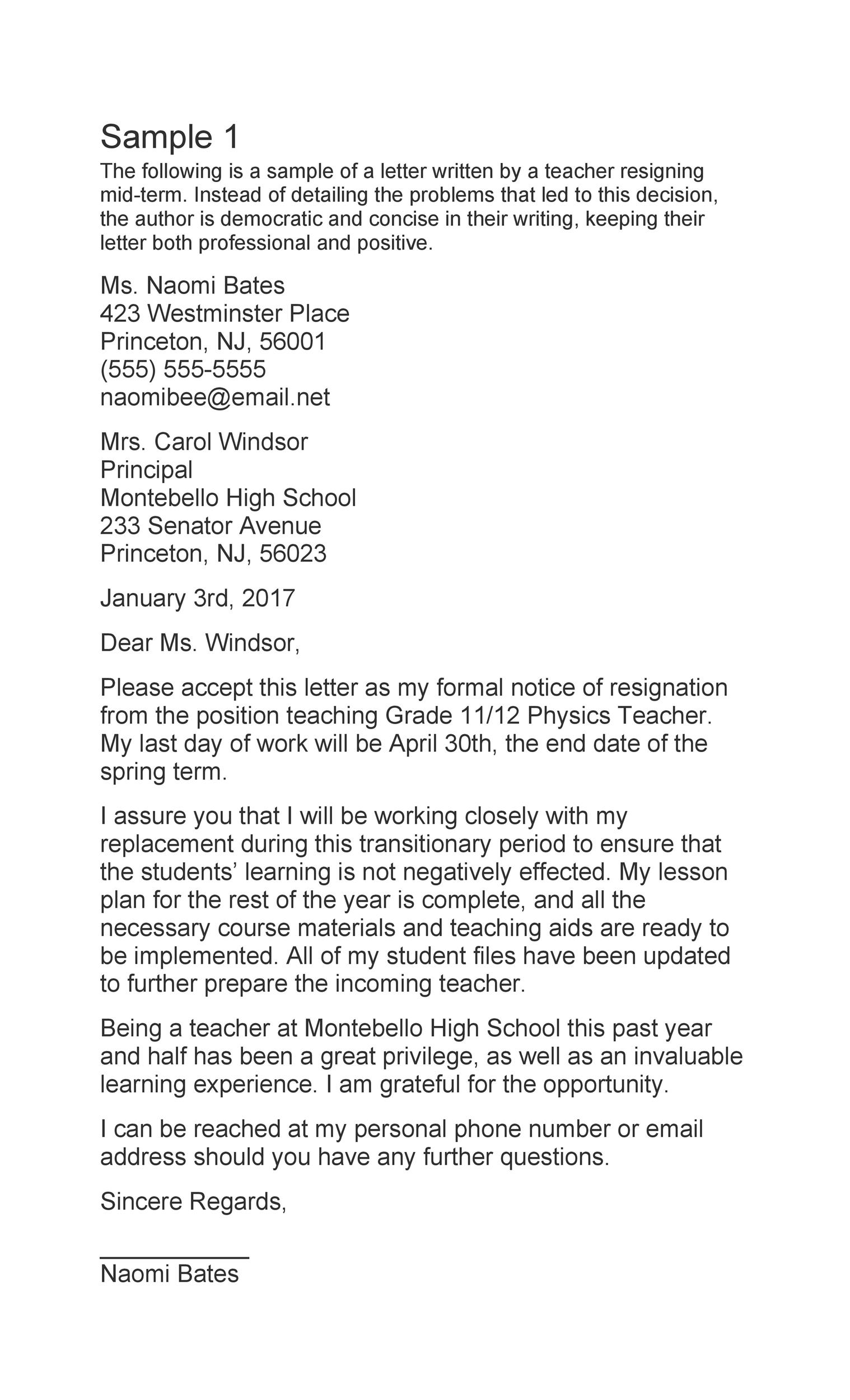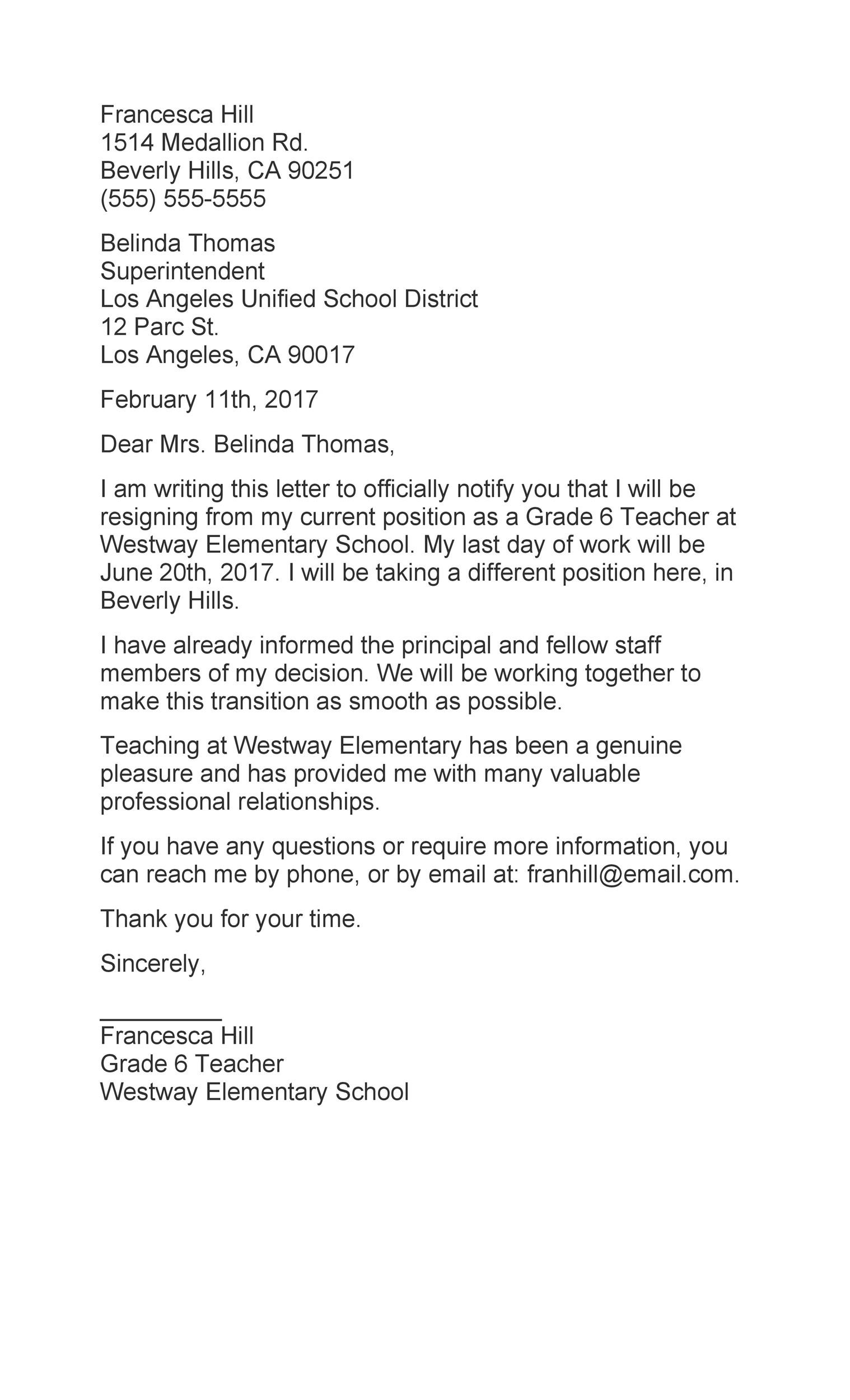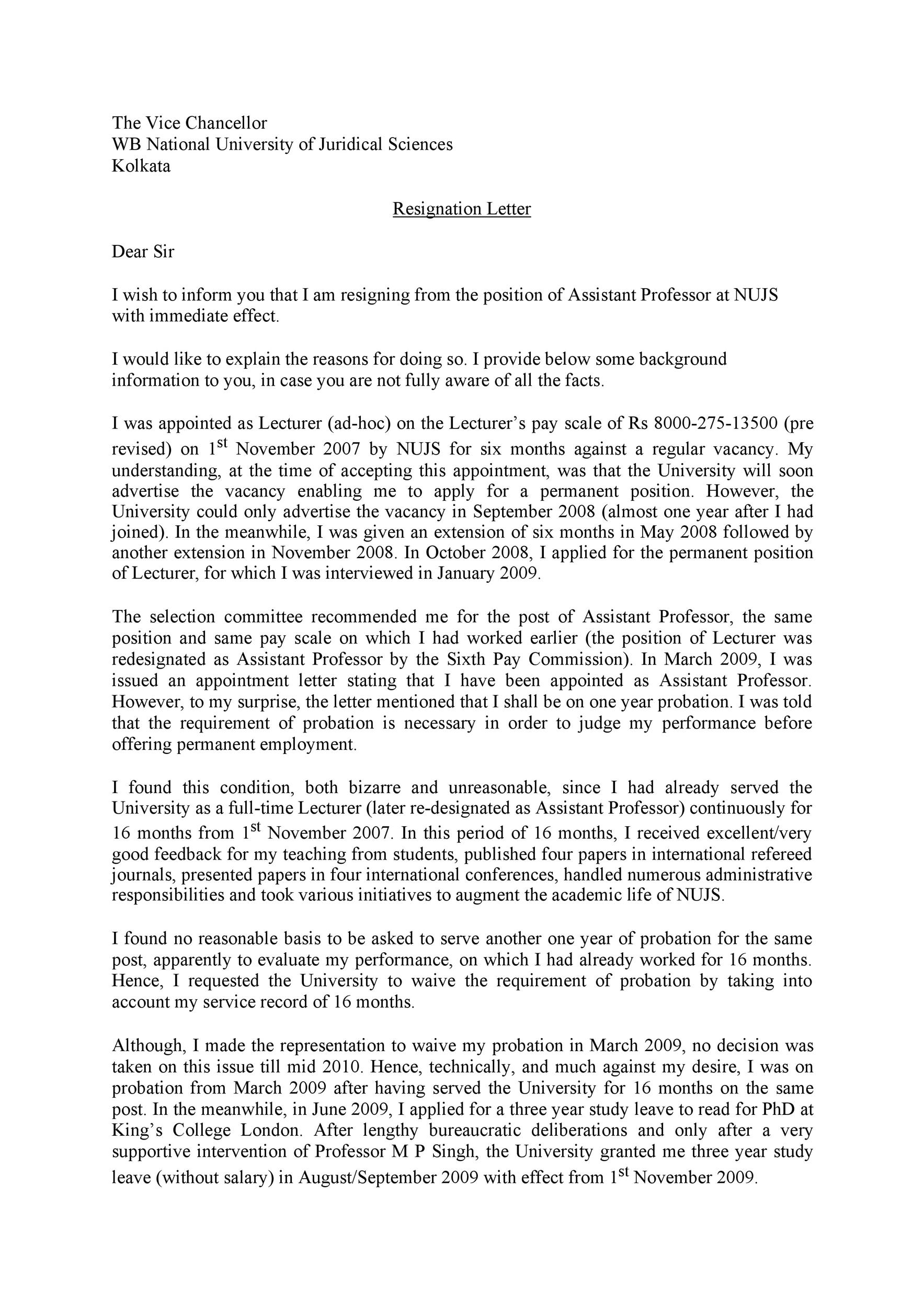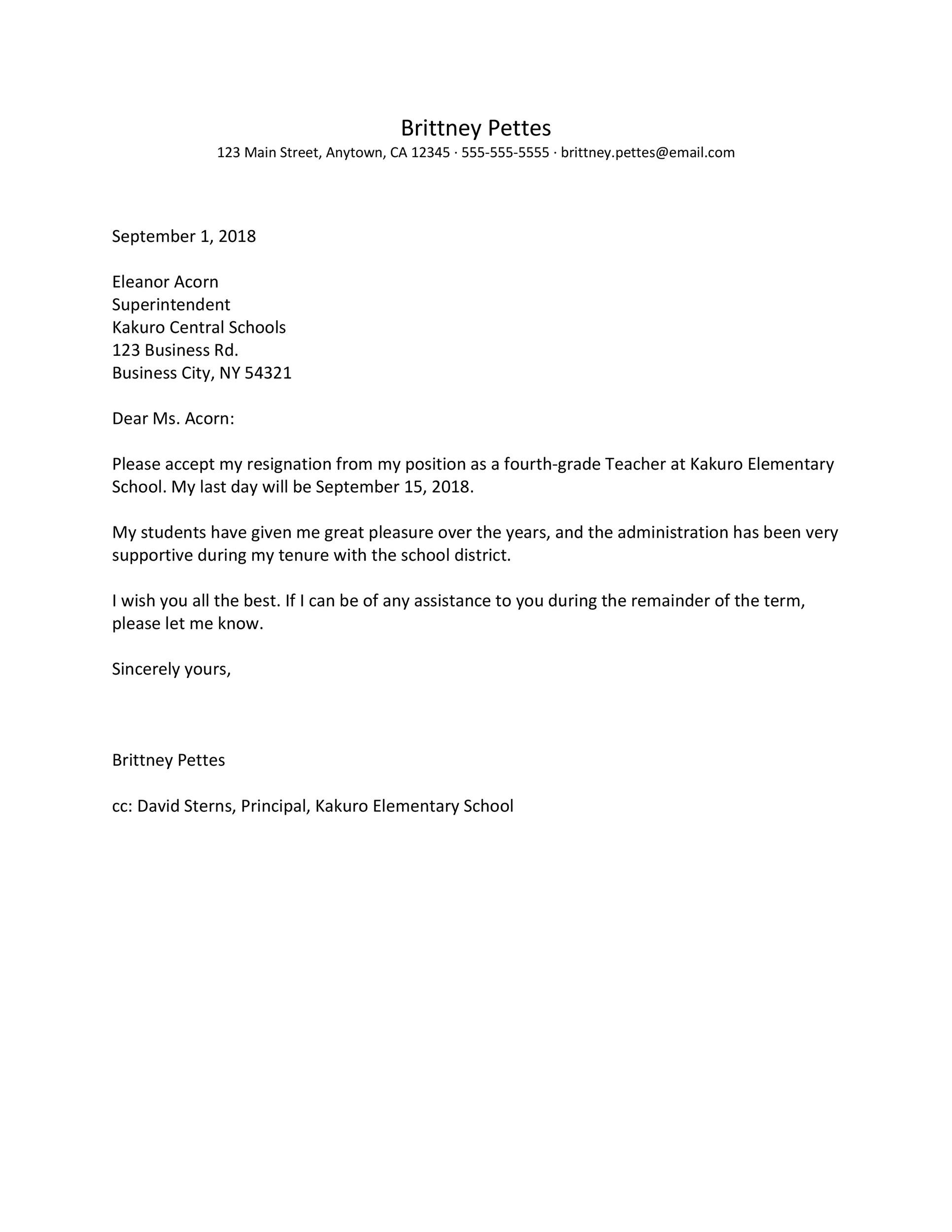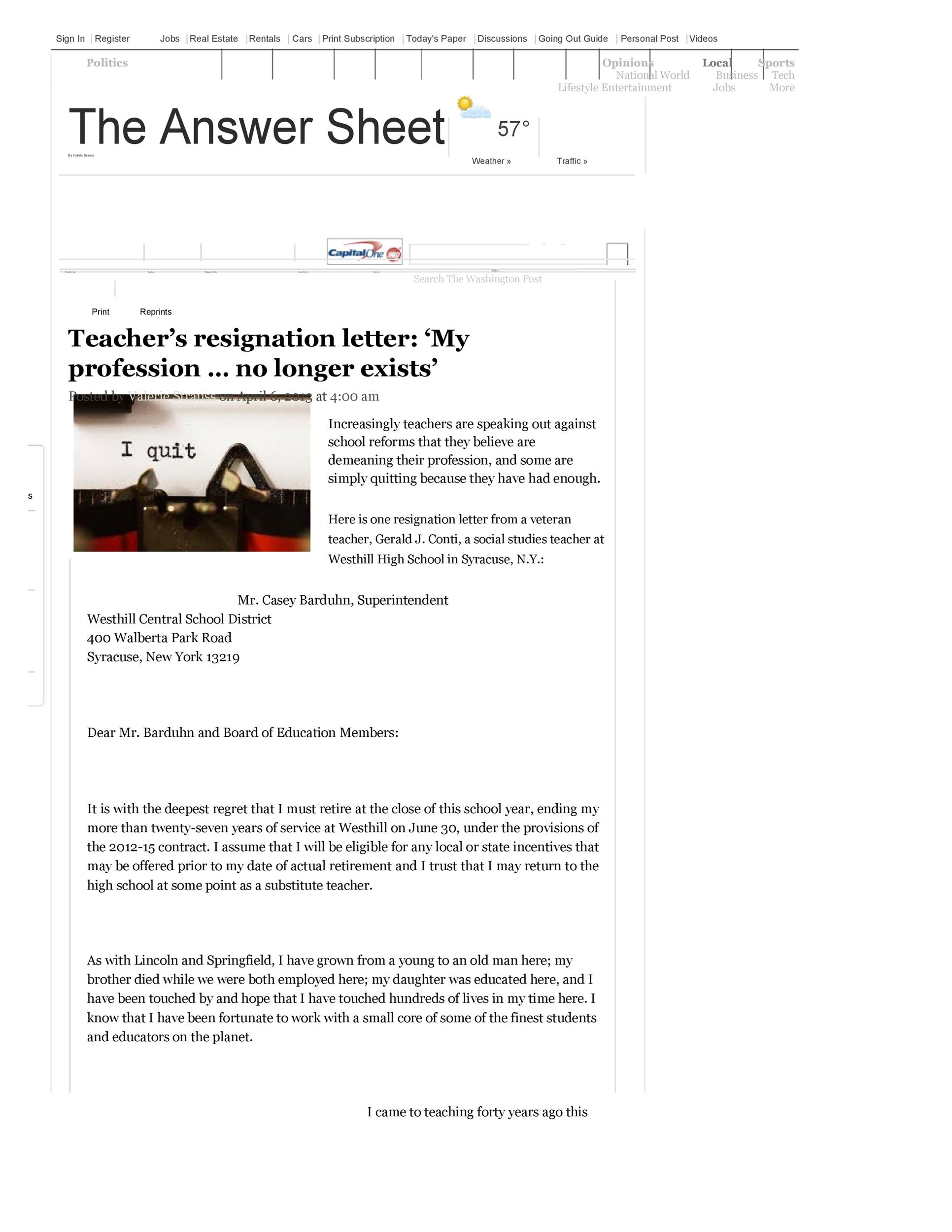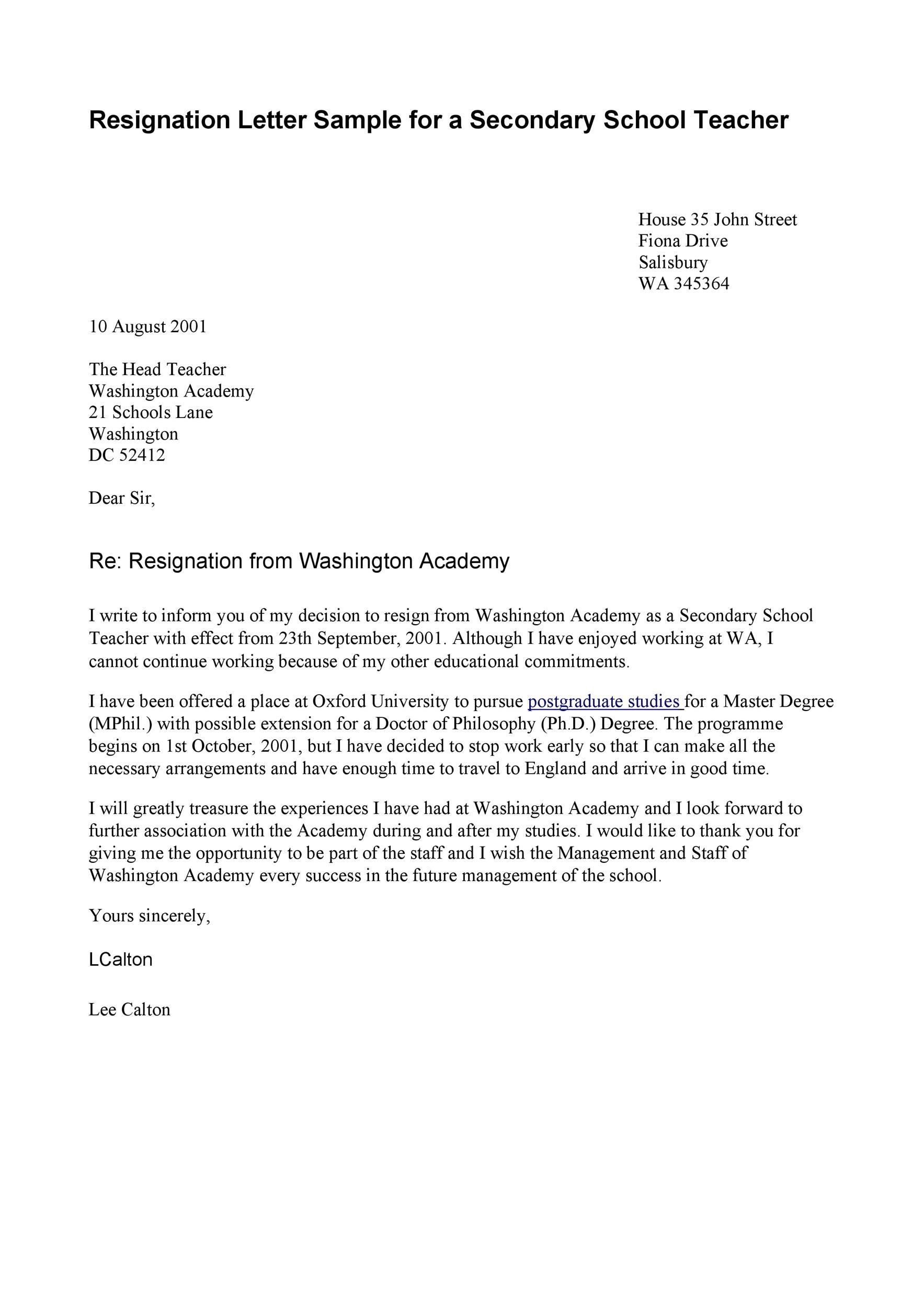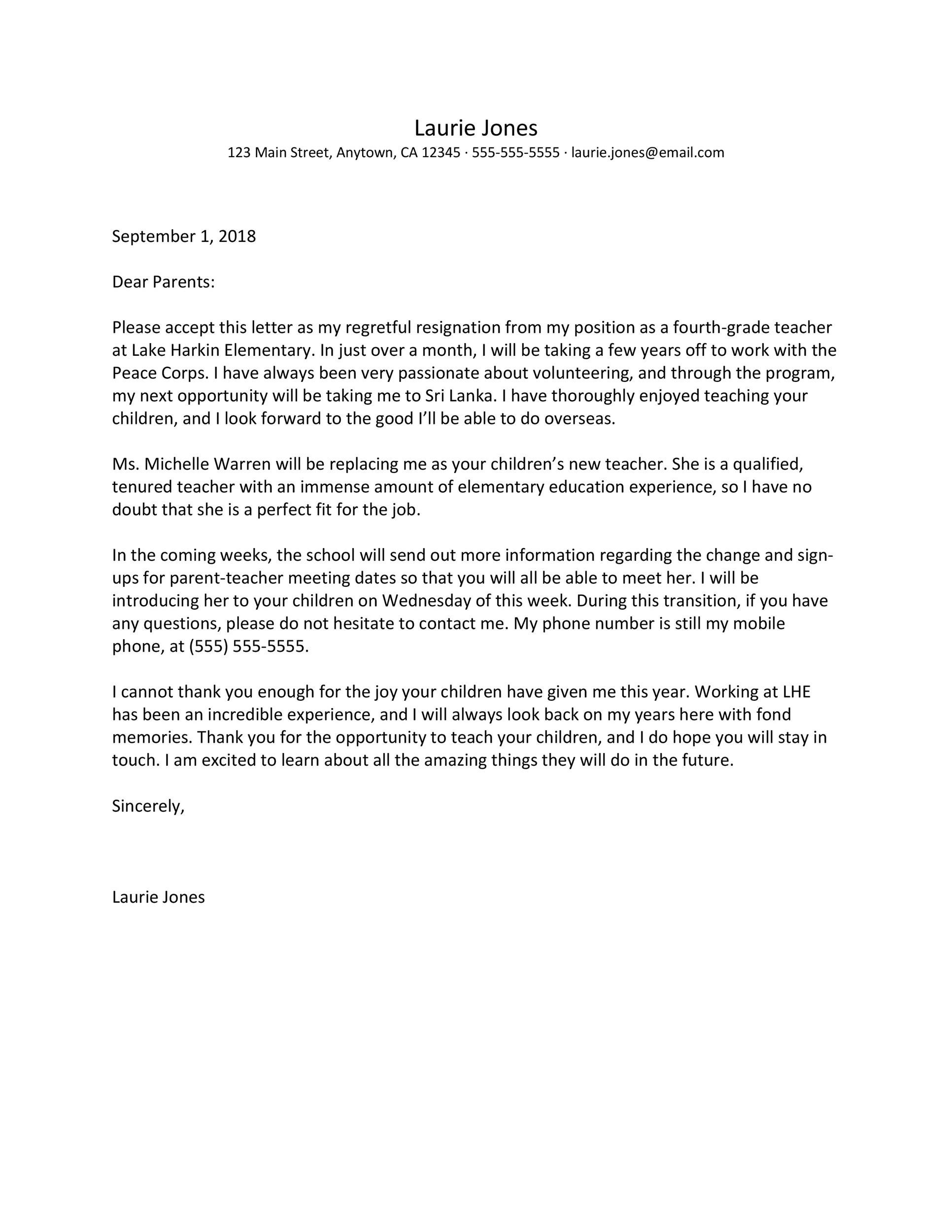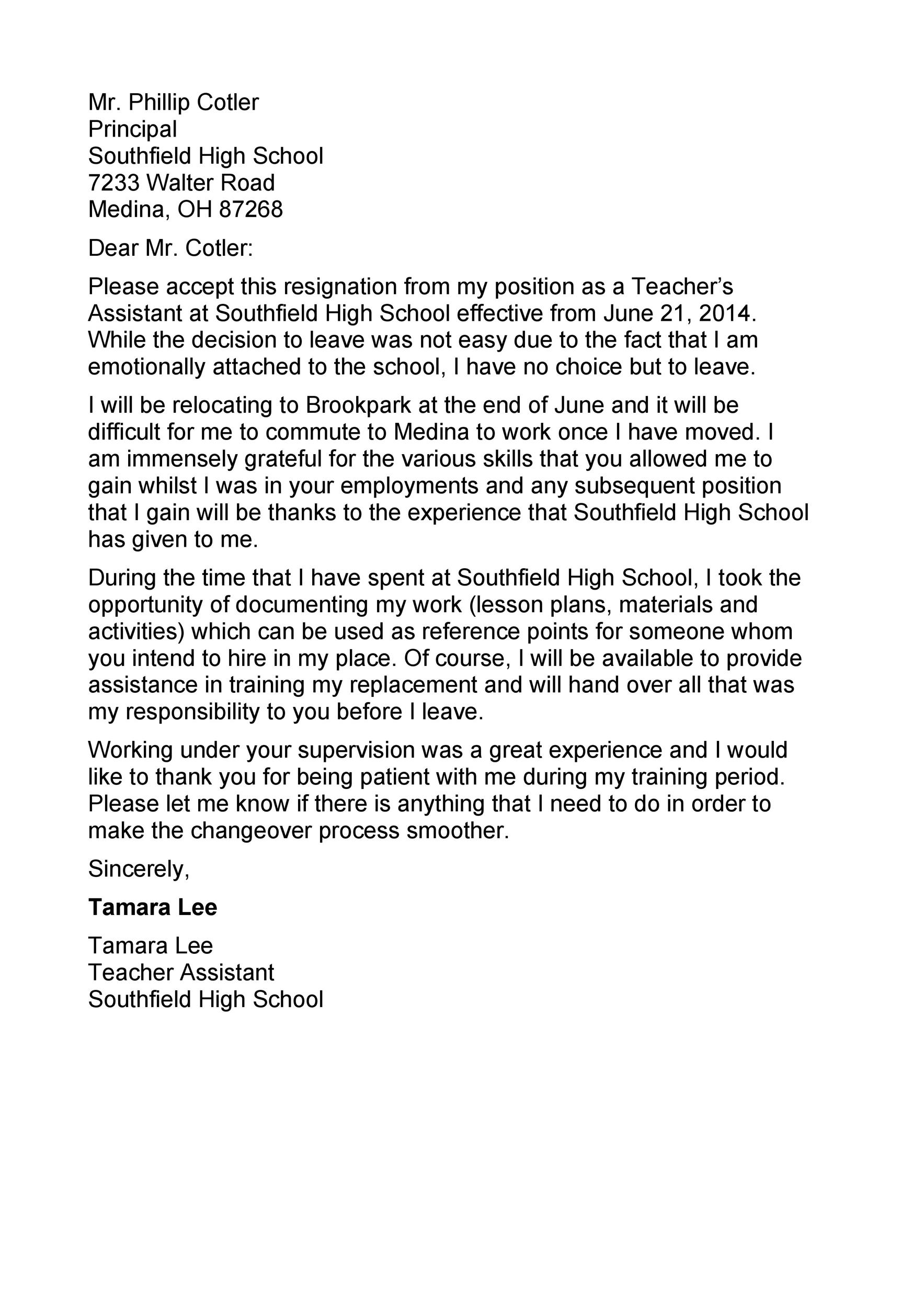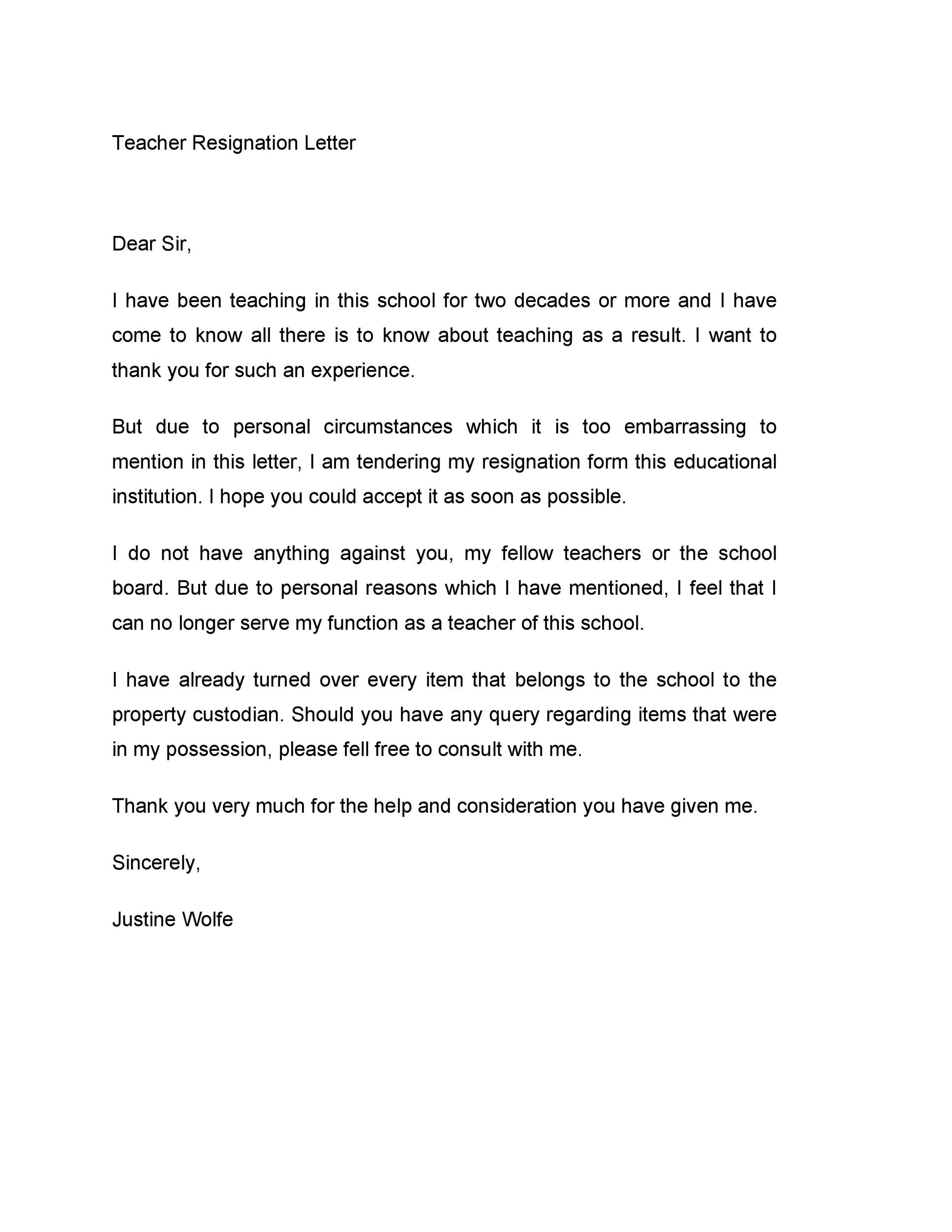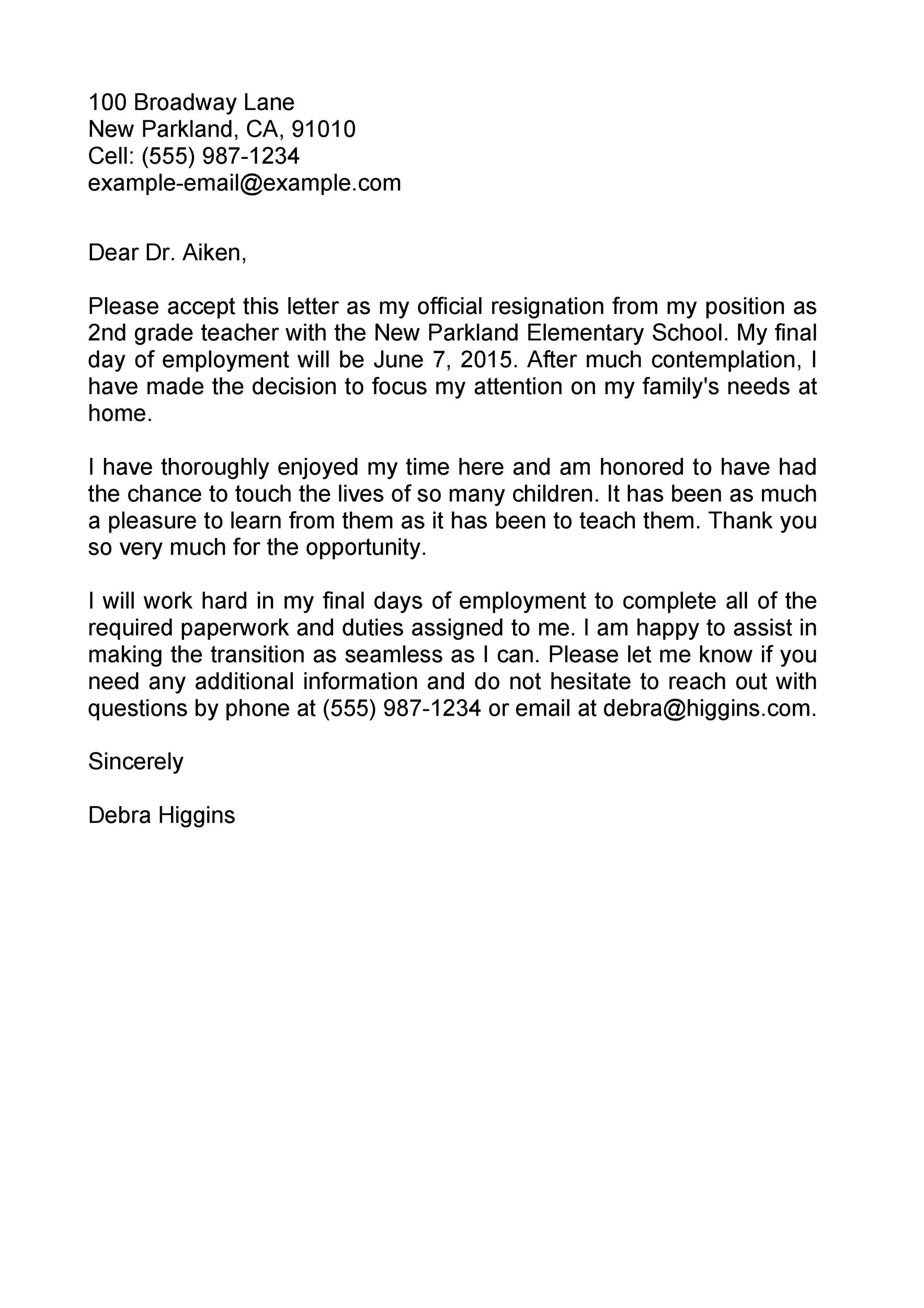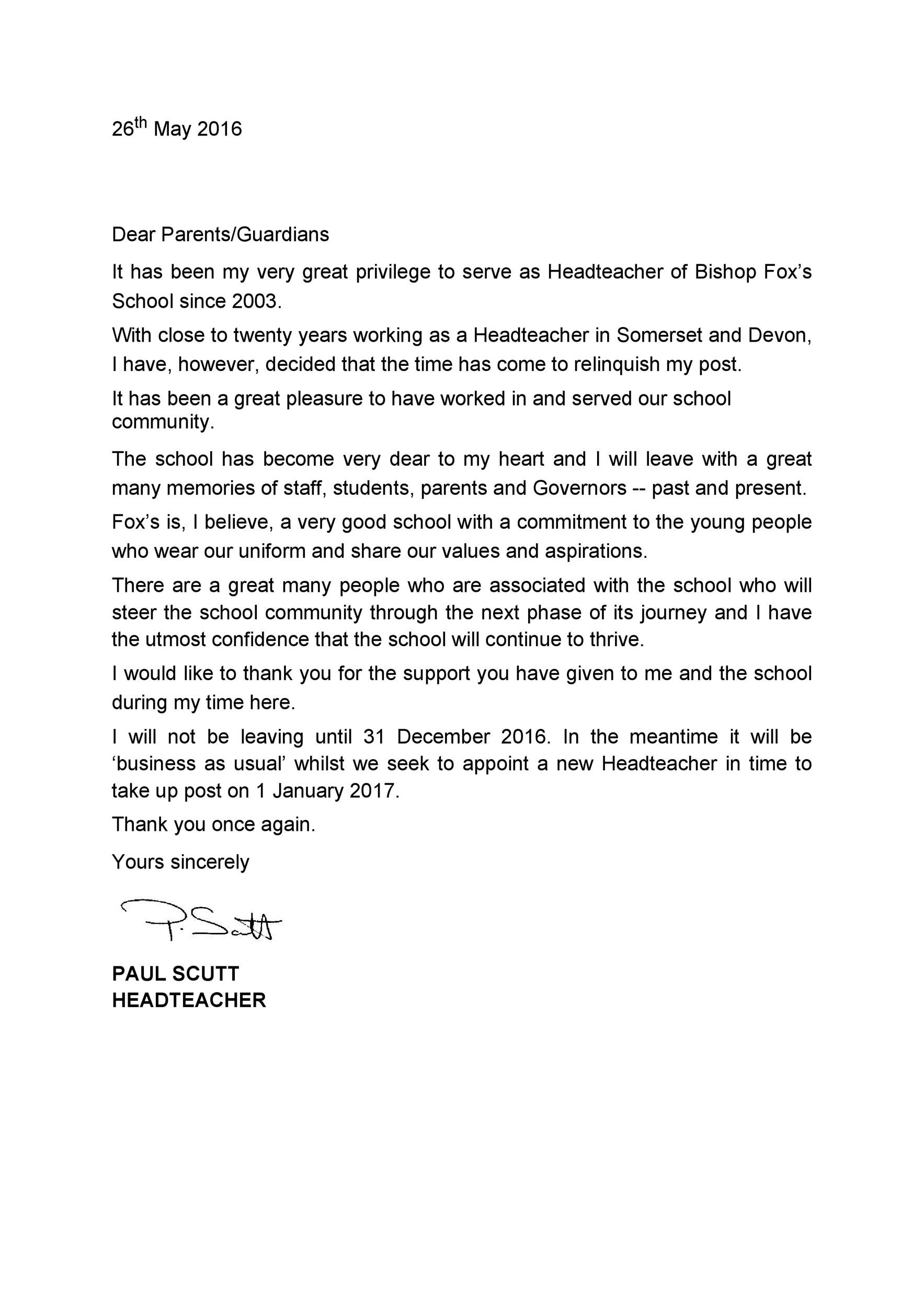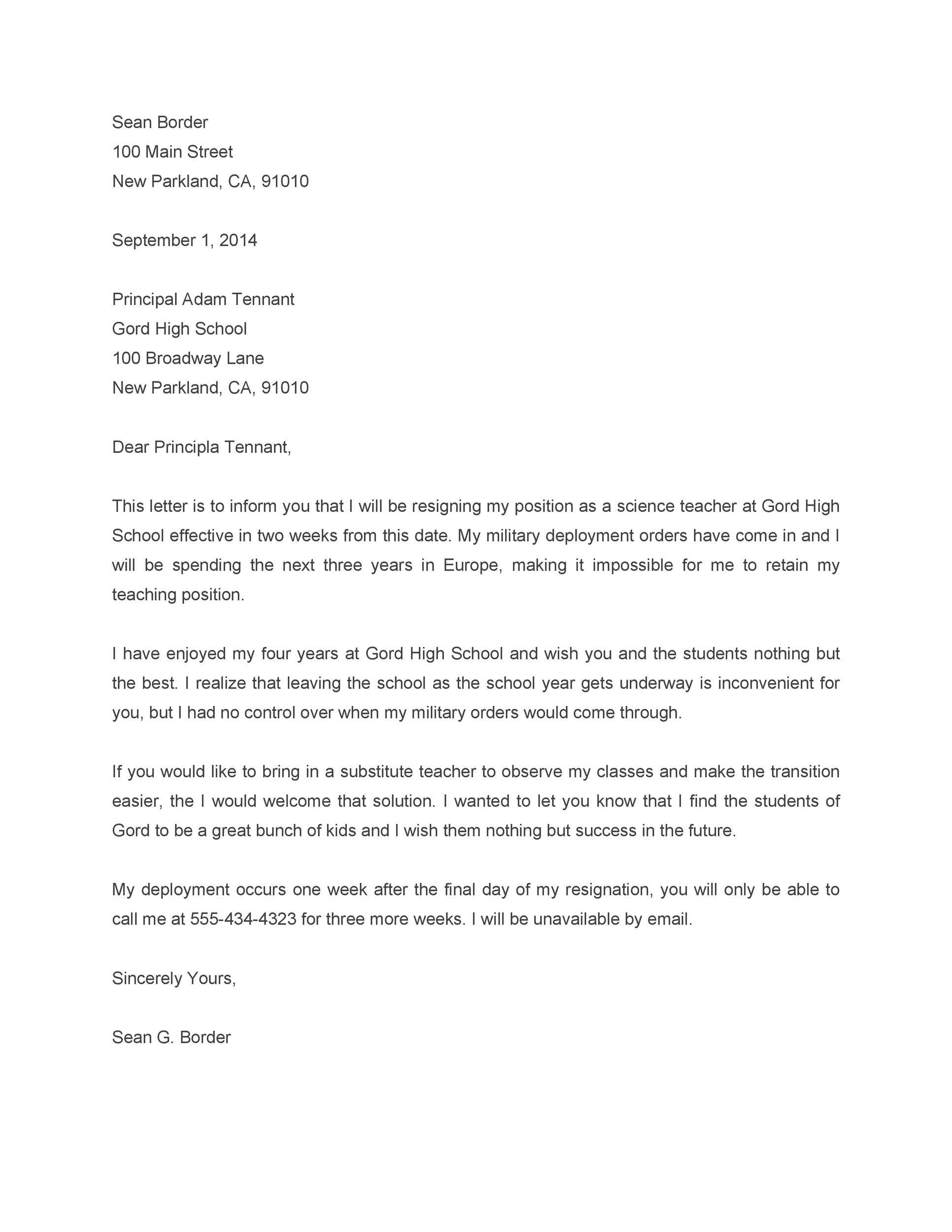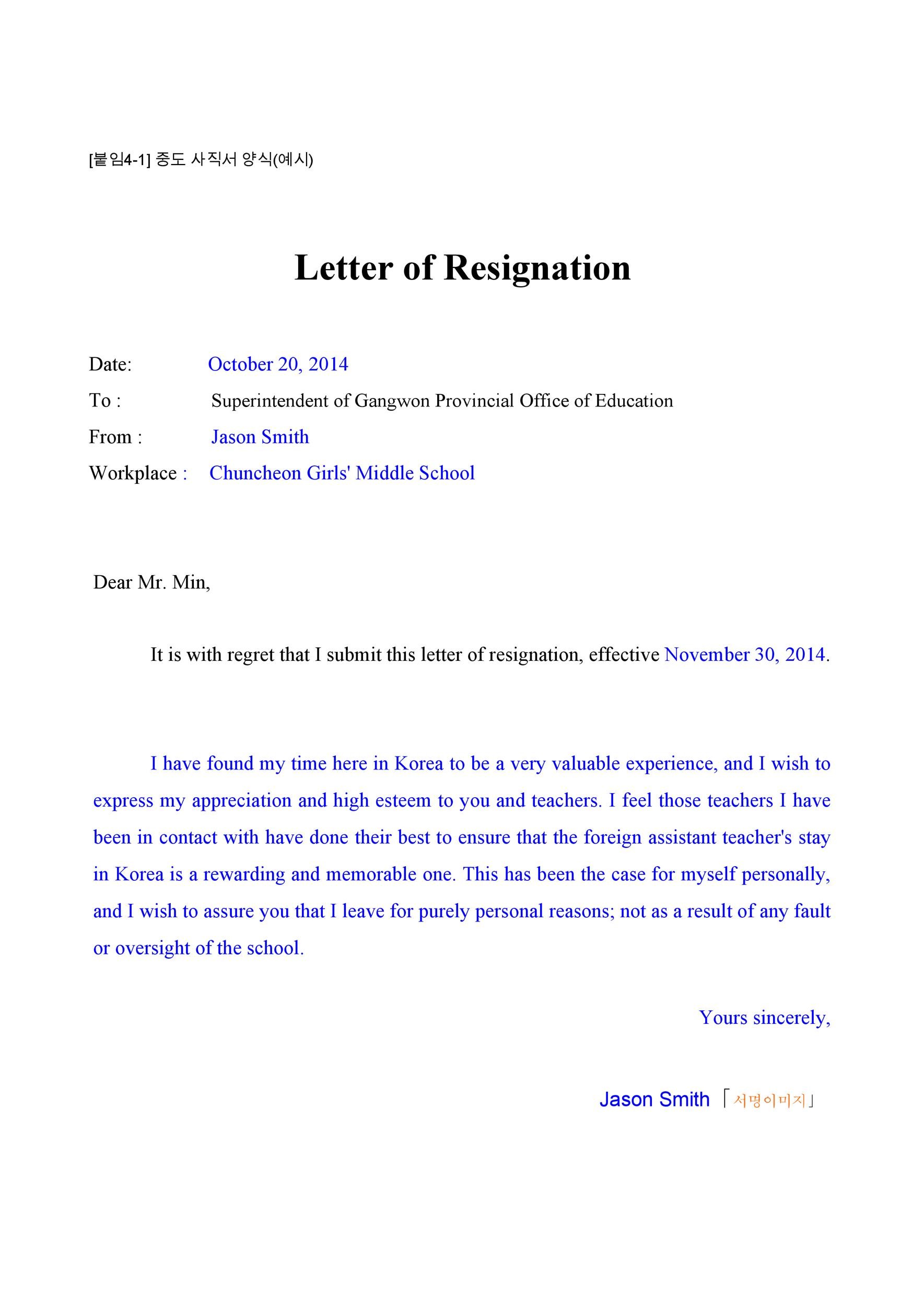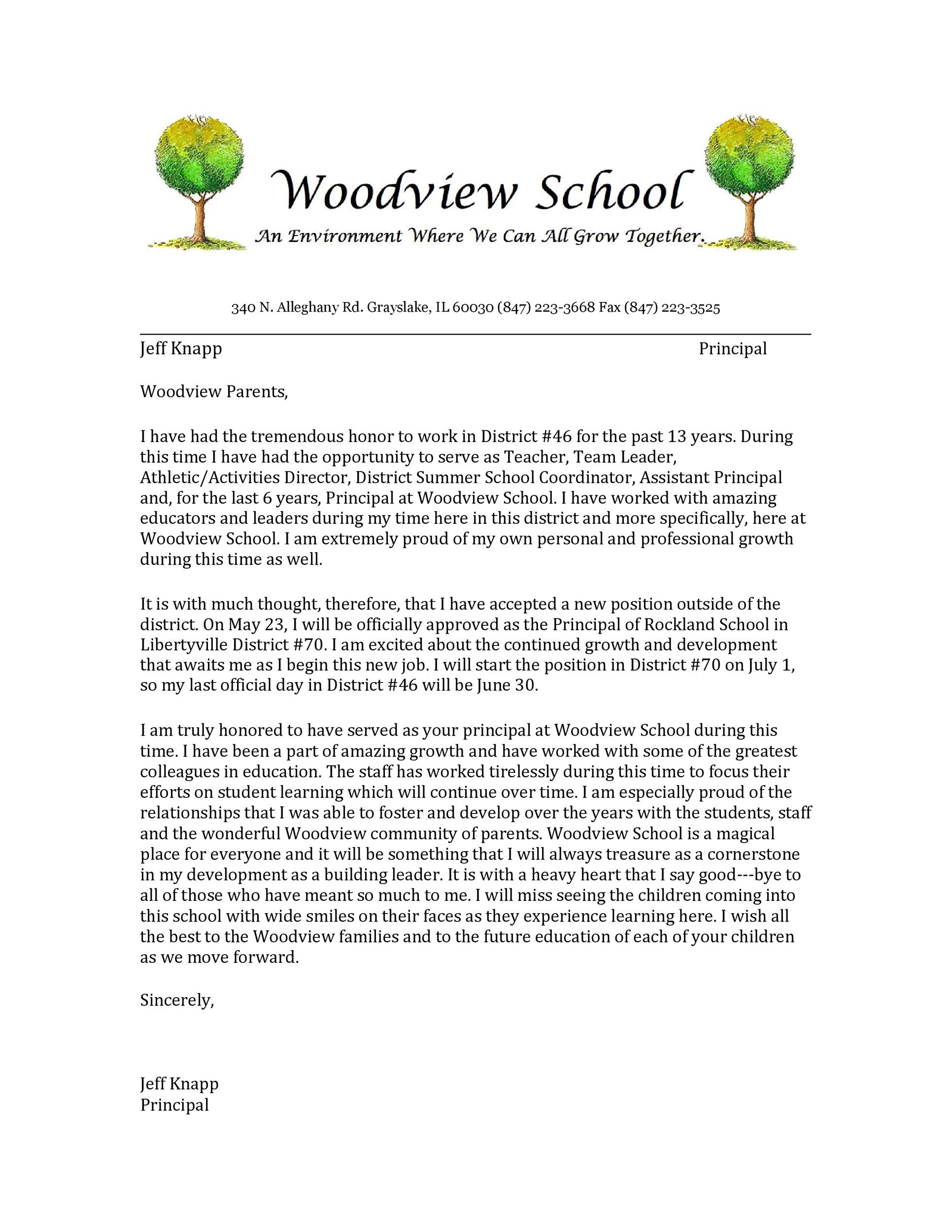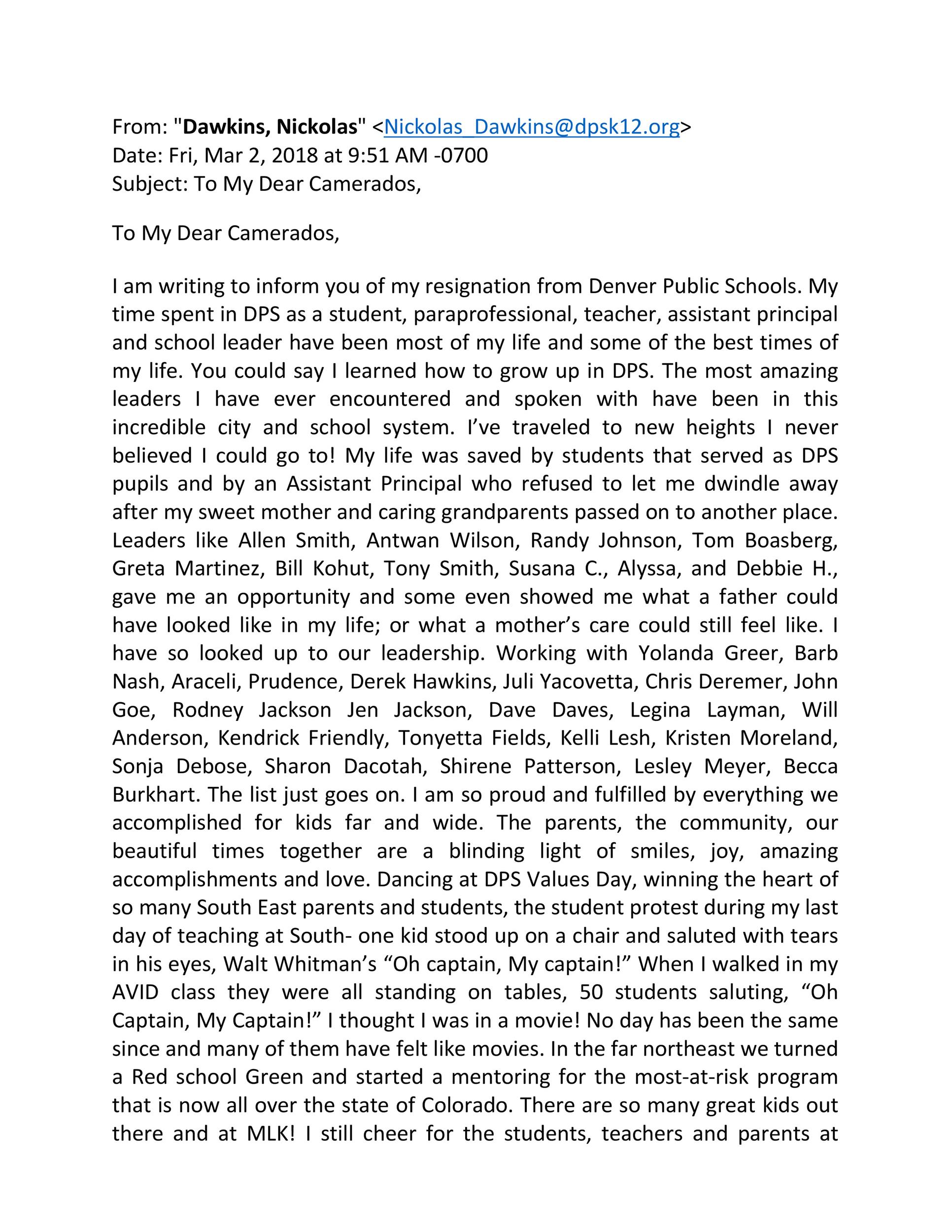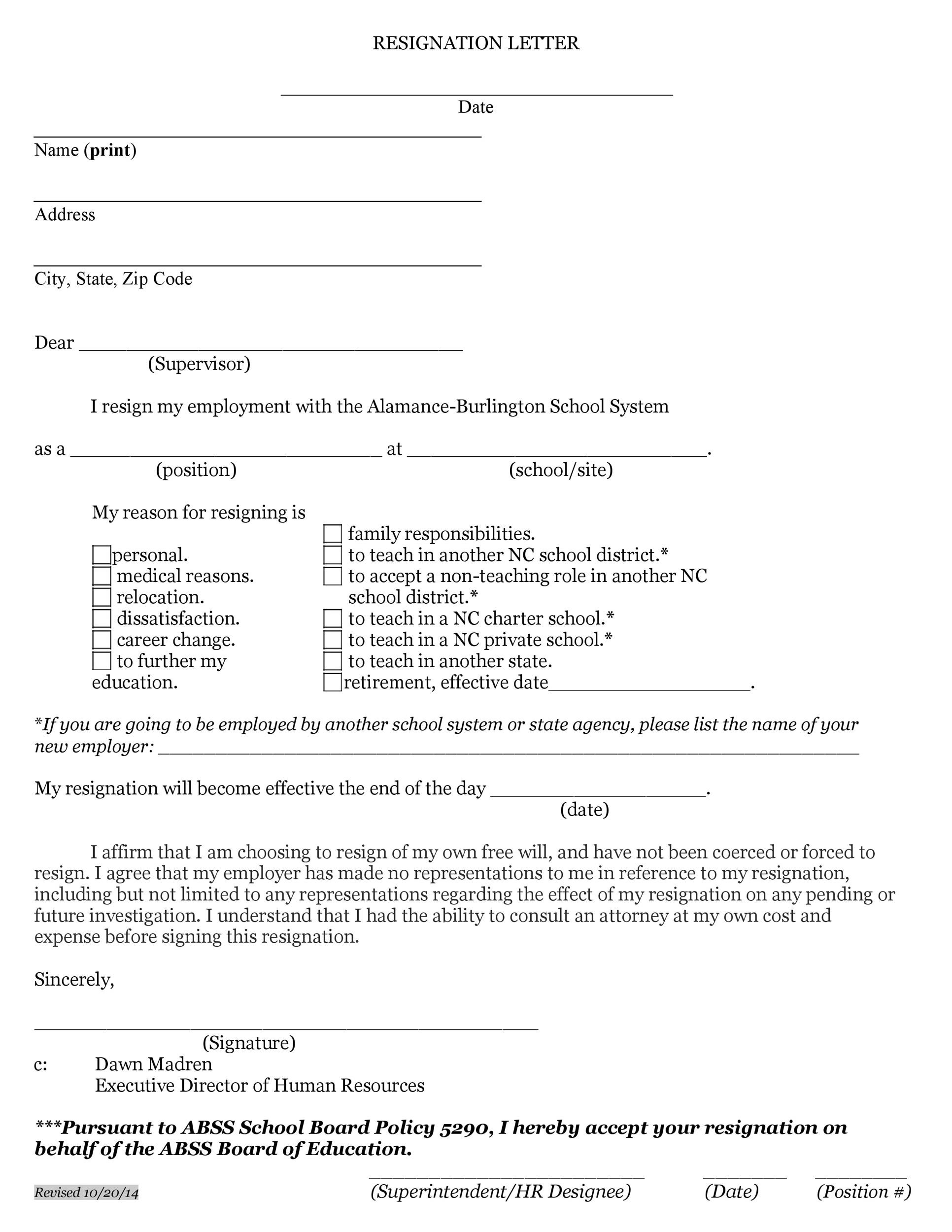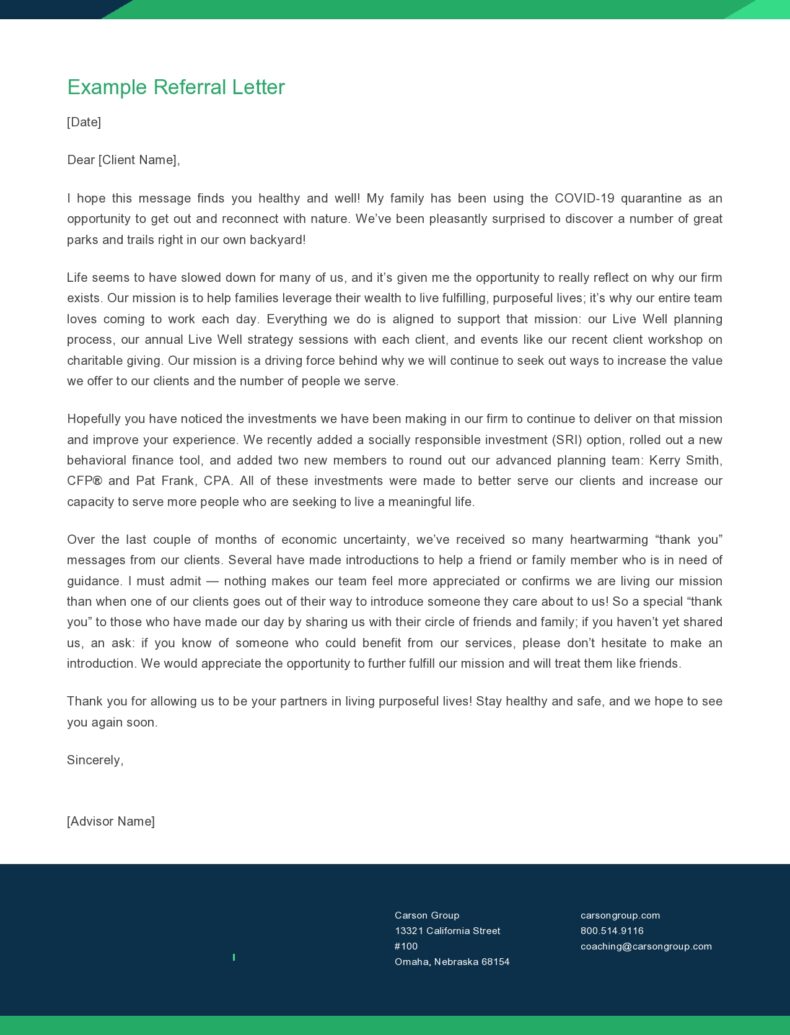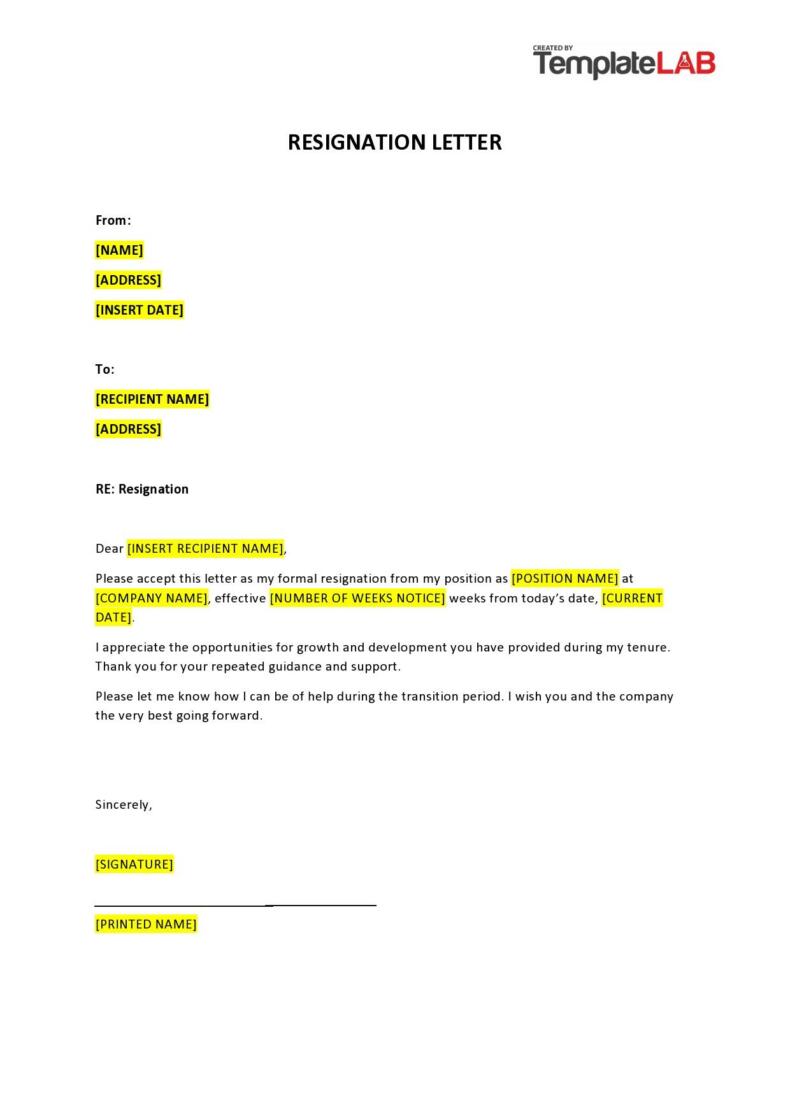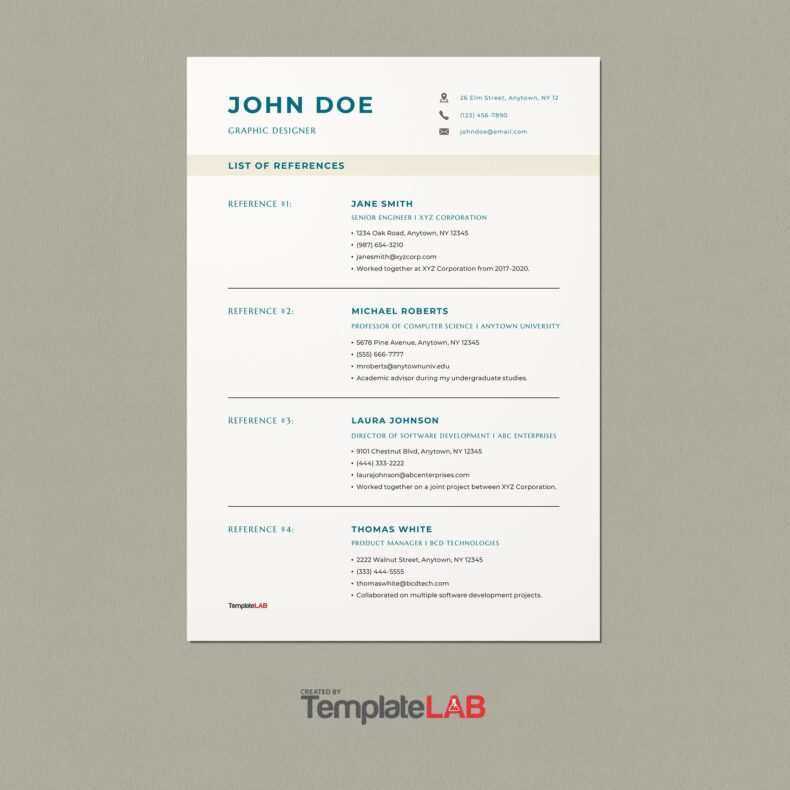If you’re planning to resign from your teaching job, you must first submit a teacher resignation letter to officially let your school’s administrators know about your decision. This is an important document in any institution. Whether you have good or bad reasons for deciding to leave your job, you must first submit a teacher resignation letter to principal and to the administration too.
Table of Contents
- 1 Teacher Resignation Letters
- 2 Parts of a teacher resignation letter
- 3 Teacher Resignation Letters For Another Job
- 4 Tips for composing your teacher resignation letter
- 5 Teacher Resignation Letters To Principal
- 6 Things to avoid when writing your resignation letter
- 7 Teacher Resignation Letters For Personal Reasons
- 8 How to properly resign from teaching?
- 9 Teacher Resignation Letters Examples
Teacher Resignation Letters
Parts of a teacher resignation letter
When you write your teacher resignation letter, make sure to include a statement declaring your intent to resign. This is the most important part of any teacher resignation letters examples. Whether you plan to compose a teacher resignation letter for another job, a teacher resignation letter to principal, a teacher resignation letter for personal reasons or any other kind of letter, include these important parts:
- Formal Letterhead
This appears at the very top of your letter. Include here your name, your contact details, the name and the position of the person you’re writing the letter to, the address of the school, and the date you wrote the letter. - Salutation and Introduction
Start your letter with a salutation directed at the person you’re writing the letter to. Then include a short introductory paragraph. State your intent, the position you hold, and when you plan to implement your resignation. This is especially important if you plan to leave the school in the middle of the academic year. - Body Paragraphs
For the paragraphs in the body of your letter, go into more detail about why you plan to resign. If you’re composing a teacher resignation letter for another job, explain this in a professional way. Remember that the administration will keep your letter on file so make sure it has a positive and professional tone.
If you plan to compose a teacher resignation letter for personal reasons, then you may state these reasons as long as you feel comfortable with it. If not, you may just mention that you’re leaving for personal reasons which you’re not keen on discussing.
In this part of your letter, you may also want to express your appreciation and gratitude to the person you’re writing to and to your school. You don’t have to say too much, just a simple statement or two which say how happy you were while working at the school. - Conclusion
End your letter with a concluding paragraph or sentence followed by a sign off statement, your full name, and your signature. Here, you can restate your appreciation and gratitude. You may even state your willingness to keep in touch in case they need help from you.
Teacher Resignation Letters For Another Job
Tips for composing your teacher resignation letter
When you look at teacher resignation letters examples, you’ll see that there are several reasons why teachers resign from their work. If you plan to write your own teacher resignation letter, here are a few tips for you to make sure that you can professionally and clearly communicate your intention:
- Be as concise as possible
As you compose your letter, keep it brief and straight to the point. Remember to include all of the most important information like your contact details, your reason for resigning, and the effective date of your resignation. There’s no need to include negative information which might end up burning bridges. - Provide proper notice
Whether you’re composing a teacher resignation letter for another job or your reason is more personal in nature, make sure to give the school adequate notice. It would be very difficult for any institution to cope when one of their employees leaves without enough notice.
This is especially true for schools because children have already built a rapport with them. Therefore, not providing proper notice may cause problems between you and your school which, in turn, may jeopardize your future employment. - Maintain your professionalism
Again, no matter what your reason is for leaving, never express your frustrations and negativity in the letter. As much as you can, try to remain upbeat and positive. This allows for a smoother transition and for a more positive response from your school’s administration too. - Schedule an exit interview
Before you resign, you must have an exit interview or some other kind of meeting with your superintendent or principal. This is where you can further express your reasons for deciding to move on. Although you may give more details about your reasons, don’t make this a time to rant.
Maintain your professionalism even during your exit interview. If you have any constructive criticism to share, this is the time. Also, if your principal or the administrators of the school give you constructive criticism as well, accept it and learn from it. - Make sure that you’re certain about resigning before submitting your letter
Resigning from any position is a big deal. It means that you have to find another job if you want to keep earning money to support yourself and your other obligations. Before you submit your letter, make sure that you’ve thought about everything carefully.
This is very important, especially in cases where you plan to leave in the middle of the school year. Doing this usually leaves a negative impression so you should make sure that you have a solid reason for doing it.
Teacher Resignation Letters To Principal
Things to avoid when writing your resignation letter
Writing a teacher resignation letter doesn’t have to be a difficult task. As long as you have a good reason for deciding to leave and you have some experience in writing letters, you can create a great letter. However, there are also some things you may want to avoid when writing any kind of resignation letter.
Here are some of the most common mistakes people make which you must avoid. That is if you want your letter to be both effective and well-accepted:
- Writing rude or negative comments against the school or the administrators
Even though the administrators of your school didn’t treat you well, you must never write any rude or negative comments about them. Remember that this is an official document which they will keep on record. So, if any potential employers do a background check, your previous employer can use this letter against you.
Also, keep in mind that you’re already leaving the institution. There’s no need to spread negativity anymore. It’s better to feel thankful that you’re leaving on a good note and that you won’t have to deal with those people anymore. Since this is an official document, focus on the purpose of the letter and nothing more. - Using improper language
No matter how close you are with the person you’re addressing the resignation letter to, you shouldn’t use improper language. Don’t get too comfortable when composing your letter. Remember, you should maintain professionalism at all times because the addressee won’t be the only one reading the letter. - Using a negative tone throughout the letter
When you leave, you want to leave a good impression behind. When your recipient reads your resignation letter and it has a negative tone all throughout, he/she won’t feel too good about it. Then anyone else who would read your document might even feel negatively towards you! - Having a lot of spelling and grammatical errors
This is a huge no-no in any formal document, especially when coming from a teacher. Before you submit your letter, proofread it. Check for any errors in spelling and grammar. It’s even better if you ask other people to proofread your letter as they might see mistakes which you’ve missed. - Mentioning the salary you’ll receive from your new job
Even if you’re really happy to leave because the new job that’s waiting for you offers you more money, this doesn’t mean that you should share this information with your school’s administration. There’s no need to mention anything about your new job as the readers might interpret this information in a negative way.
Teacher Resignation Letters For Personal Reasons
How to properly resign from teaching?
Composing the teacher resignation letter is only one part of the resignation process. Whether you’re not happy with your job, someone offered you a better opportunity or you have your own personal reasons for leaving, you must resign in a proper way. Here are some steps for you to follow:
- Make sure you have a new job in the works
Before you resign from your current job, make sure that you already have another job lined up and your chances of getting hired are high. This allows you to make a smooth transition between jobs and you won’t have to survive without income for a significant period of time. - Speak to your principal
Right after you’ve made your final decision, speak to your principal about your intention. This conversation may go both ways. You may feel more firm about your decision or your principal may convince you to stay. Either way, this conversation is an important part of the process. - Submit your resignation letter
After speaking to the principal and he/she has agreed with your decision, you may now submit the letter you’ve composed. - File your resignation
The next step is to file your resignation with the school board or with any other person in your school who handles resignations. This is also an important step so you can have everything arranged before you leave.

